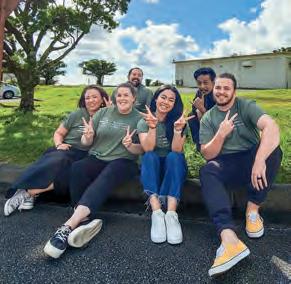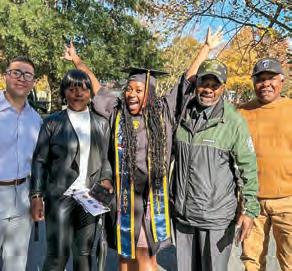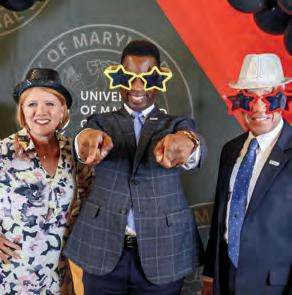ACHIEVER

UNIVERSITY OF MARYLAND GLOBAL CAMPUS | 2024



REIMAGINED RETOOLED REBORN
The changing face of the 21st-century university











UNIVERSITY OF MARYLAND GLOBAL CAMPUS | 2024



The changing face of the 21st-century university









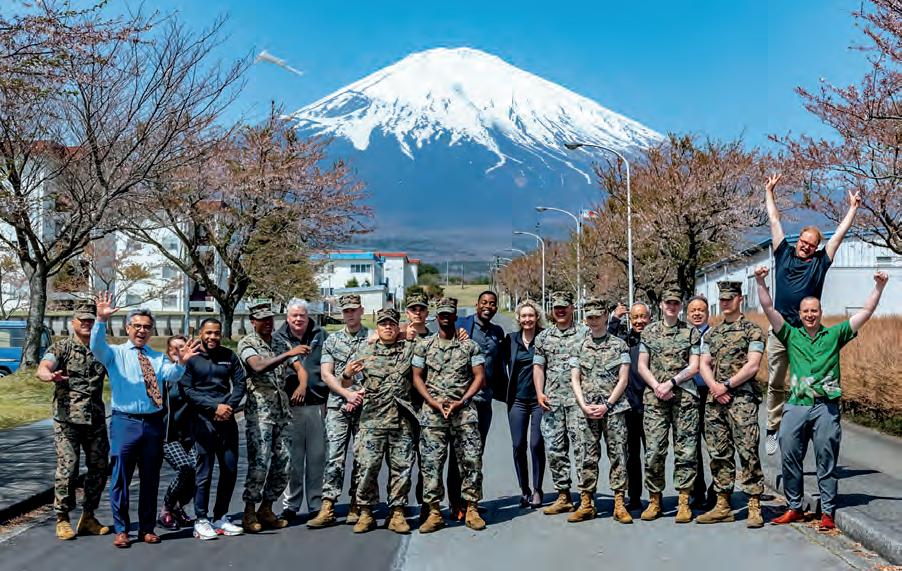
Dear Friend,
LATELY, I HAVE BEEN THINKING ABOUT THE PROVERB, “The more things change, the more they stay the same.”
At no time since land-grant universities were established in the 19th century have so many been engaged in public discussion of the role of postsecondary education—what it is, who should do it, how it should be done, and what the outcomes should be.
Seventy-five years ago, only the University of Maryland responded when the federal government called on institutions to find a way to bring a college education to U.S. servicemembers stationed in postwar Europe. It meant venturing into uncharted territory, trading classrooms and lecture halls for jungles and war zones, exploring new learning environments and new ways to instruct, and weighing which policies made sense and which were obstacles to learning.
Since then, across all seven continents, adapting constantly to volatile and uncertain environments, University of Maryland Global Campus (UMGC) has worked to meet students where they are, helping them achieve the desired outcomes without compromising standards.
Now, with education undergoing a rapid transformation, UMGC continues to evolve, guided by the same principles that have shaped it from the start—a willingness to stay focused on what learning is and how it happens, coupled with
President Gregory Fowler (center) with UMGC students and staff at Camp Fuji in Japan.
the will to examine every aspect of the UMGC experience through the eyes of learners.
When learners come to UMGC, we are committed to ensuring that they know and can verbalize what skills they will acquire in each learning experience and how to communicate that to prospective employers—and we expect to be held accountable for delivering what we promise.
We embrace new technologies, integrating them in ways that increase opportunities for all and that allow us to forecast and intervene before students struggle, providing the timely support they need to persist and succeed.
Today’s workforce is changing at lightning speed. As machines and artificial intelligence become integrated, some jobs or skill demands are eliminated while others evolve so quickly that traditional course and program development schedules can’t keep pace. For much of postsecondary education, the solution is not more of the same, but a fundamental rethinking of how we help learners acquire the skills they need to align with the realities of their lives and the technologies of our time.
UMGC is poised to meet that challenge by doing what we have always done. Agility, empathy, and courage have driven our growth into the largest provider of postsecondary learning in Maryland and one of the largest nonprofit public providers in the United States. By engaging with countries and cultures around the globe, we have honed our ability to listen and adapt, weaving what we learn from our global operation into our very DNA.
In the following pages, you will see firsthand how tradition and innovation combined will create the university of the 21st century—reimagined, retooled, and reborn!
Sincerely,
Gregory W. Fowler, PhD President University of Maryland Global CampusUMGC introduces American culture to global populations, even as those cultures shape the way the institution operates at home and abroad.
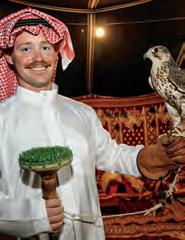 BY MARTINA HANSEN, KRISTOPHYRE MCCALL, AND DR. MICHAEL PROKSCH
BY MARTINA HANSEN, KRISTOPHYRE MCCALL, AND DR. MICHAEL PROKSCH
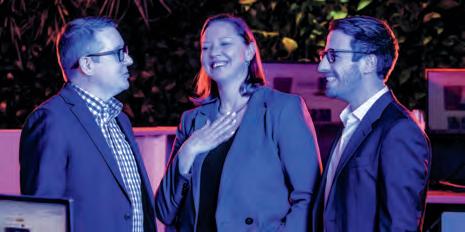
Artificial intelligence represents an exciting and sometimes perplexing challenge for an institution that leverages technology to expand access for underserved populations.
BY MARY DEMPSEY, GIL KLEIN, AND JULIE WILSONCelebrating five alumni who embody UMGC's mission of inspiring hope, empowering dreams, and transforming lives. 34 THE BUILDING BLOCKS OF A LEARNING EXPERIENCE REVOLUTION
BY MARY DEMPSEY

At UMGC, academic leaders are poised to restructure 21st-century learning experiences around the common currency of workforce-relevant skills.
SIDEBAR: Tomorrow's labor Market: Predicting the Unpredictable
BY THOMAS MORIARTYInnovative partnerships augment UMGC’s ability to reach, serve, and support new learner populations. 44 COACHING SUCCESS
BY GIL KLEINUMGC learners face a wide variety of challenges. A new, flexible model of learner support is helping more students succeed.

PRESIDENT Gregory W. Fowler, PhD
SENIOR VICE PRESIDENT, CHIEF COMMUNICATIONS AND EVENTS OFFICER
Donna Itzoe
EDITOR
Chip Cassano
ART DIRECTOR AND PHOTO EDITOR
Cynthia Friedman
DESIGNERS
Roberta Choi, Katerina Cochran, Fernando Lara Colmanni, Olya Kalatsei
CONTRIBUTING WRITERS
Mary Dempsey, Gil Klein, Thomas Moriarty, Julie Wilson
PRODUCTION MANAGER
Scott Eury
Call 301-985-7200 with comments and suggestions, or e-mail chip.cassano@umgc.edu.
University of Maryland Global Campus subscribes to a policy of equal education and employment opportunities.
Achiever is printed on forestfriendly Explorer Silk Cover and Text FSC® certified paper.
PAPER REQUIREMENTS:11,861 lbs.
Using this combination of papers saves the following: TREES: 12
TOTAL ENERGY: 5,000,000 BTUs
PURCHASED ENERGY: 1,100,000
BTUs
GREENHOUSE GASES: 7,000 lbs. CO2
WASTEWATER: 3,000 gallons
SOLID WASTE: 50 lbs.
Environmental impact estimates were made using the Environmental Defense Paper Calculator. FSC® is not responsible for any calculations on saving resources by choosing this paper.
University of Mayland Global Campus‘s (UMGC‘s) highly regarded cybersecurity program—one of the first in the nation to be offered fully online— continues to earn accolades.
The university received a Cybersecurity Diversity Trailblazer Award from the Cybersecurity Association of Maryland, Inc. (CAMI), at a special awards ceremony on October 26, 2023, in Columbia, Maryland. UMGC ranks No. 1 in Maryland in granting cybersecurity and IT degrees to women and students of color, and the award recognizes the university’s efforts to prepare an inclusive cybersecurity workforce.
“The 2023 Cybersecurity Awards exemplify the best of what our cybersecurity industry has to offer,” said Chris Sachse, board chairman of CAMI and CEO of Think|Stack, a managed IT services company. “The winners demonstrate not only the depth and diversity of the cybersecurity industry but the ability for the industry to meet what has become a critical need for our nation and all businesses.”
Meanwhile, the university’s cybersecurity competition teams continued to record strong results in national and international events in 2023, including first- and second-place finishes among four-year universities in the CyberMaryland 2023: Mary -

land Cyber Challenge and Competition, which this year was hosted by UMGC.
UMGC student Aidan Bennet, the only undergraduate on the winning team, recorded the best individual performance during the two-day event, answering 25 questions correctly in the capturethe-flag (CTF) competition.
Earlier, the competition team kicked off the 2022–2023 season with a secondplace finish at the Parsons Cyber CTF in Denver, Colorado—a Jeopardy-style competition that tested participants’ knowledge in topics like network forensics, coding, web hacking, cryptography, analytics, penetration testing, malware analysis, algorithm, and reverse engineering. Teams scored points by being the first to answer a question successfully, with some questions weighted.
The competition team followed up with another second-place finish, this one at
the 15th annual Mid-Atlantic Gigabit Innovation Collaboratory Competition (MAGIC) Capture-the-Flag event, which drew university teams from around the world. As further evidence of the cybersecurity program’s impact, this year’s MAGIC competition was run by Jonathan Woodward, a UMGC alumnus who previously won the MAGIC event as a member of the competition team.
Finally, the team rose to third place in the HackTheBox rankings among U.S.-based teams and eighth overall in the world.
“HackTheBox is well known among the hacking community because of its ranking tiers and its relevance to real-life workplace challenges,” said Jesse Varsalone, collegiate associate professor of cybersecurity technology at UMGC and faculty coordinator of the cybersecurity competition team. “Students are able to practice compromising machines in an isolated environment to gain
invaluable experience outside the classroom.”
Roughly 250 U.S.-based schools compete in HackTheBox, with 1,000 universities competing worldwide.
In June 2023, University of Maryland Global Campus (UMGC) announced that it had received a new, five-year contract from the U.S. Department of Defense to continue teaching U.S. troops in Europe. The contract—effective August 1, 2023, to July 31, 2028—continues an uninterrupted tradition of service that began in 1949 when the institution sent seven faculty members overseas to teach U.S. troops stationed in postwar Germany.
“Our service to the U.S. military has been part of the very foundation of our university and a cornerstone of our global reputation,” said UMGC President Gregory W. Fowler. “It has shaped UMGC in fundamental ways, highlighting the flexible, can-do spirit that has driven innovation across our institution for more than 75 years. And it testifies to our commitment to our public mission and to meeting students where they are.”
The contract calls for UMGC to offer select, exclusive undergraduate and graduate instruction at military installations across Europe. Currently, UMGC offers classes and/ or services at some 45 locations in Belgium, Germany, Greece, Italy, the Netherlands, Portugal, Spain, Turkey, the U.K., and other locations as required.
Currently, some 56,000 military-affiliated learners attend UMGC each year, and the university is regularly cited by Military Times for its ongoing commitment to U.S. servicemembers and veterans.
In 2023, for the second consecutive year, Military Times ranked UMGC No. 1 among online and hybrid institutions in its listing of “Best for Vets–Colleges” for providing higher education to veterans and for supporting the veterans who work at UMGC.
In its 2023 listing of “Best for Vets–Employers,” UMGC was the top-ranked educational institution, praised for being attuned to the needs of veterans who aspire to work for the university.
“Providing employment and promotion opportunities at
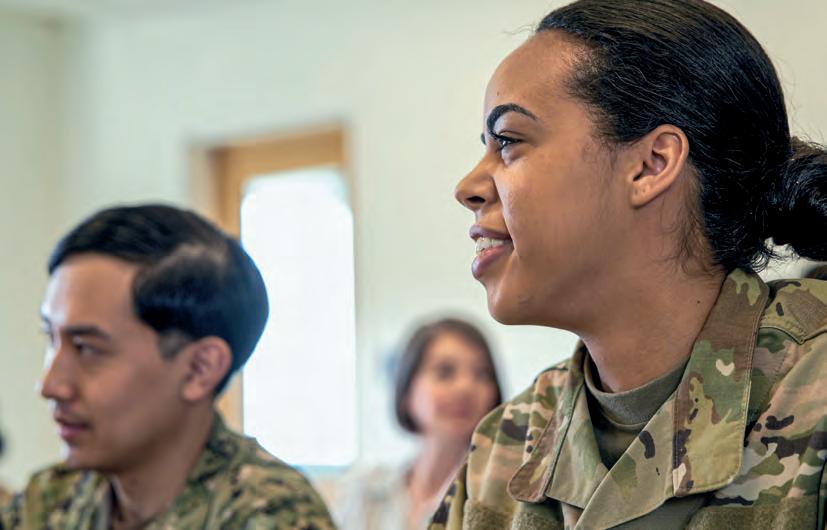
our university for veterans is one of my top priorities,” said Lloyd “Milo” Miles, UMGC’s senior vice president for Global Military Operations. “It’s a key differentiator for UMGC— supporting our connection with the U.S. military for both active-service personnel and veterans seeking job opportunities as they transition to civilian life. Both of these priorities help military-affiliated personnel pursue their goals and their dreams, and ultimately, transform their lives.”
In July 2023, University of Maryland Global Campus (UMGC) hosted an intensive, weeklong GenCyber Infusion and Immersion Teacher Camp for 20 middle school and high school teachers, designed to help them more effectively integrate cybersecurity concepts into existing courses.
“Teaching K–12 students about cybersecurity early empowers them to navigate the digital world safely and responsibly,” said Brandie Shatto, program chair for the GenCyber Camp and professor of instructional technology at UMGC. “Equipping students with cybersecurity knowledge fosters a culture of digital citizenship, enhances their critical thinking skills, and prepares them to protect themselves and others from cyber threats in the future.”
The GenCyber program is administered by the U.S. Department of Defense and represents an important component of the national cybersecurity education ecosystem. Those who were accepted to the weeklong program paid no costs or fees and received a certificate of completion, a $1,000 stipend
ethics, and the emerging world of virtual reality.
“The aim of the virtual reality immersion component was to ensure that teachers received training and support to effectively integrate VR into their curriculum,” said Dr. Loyce Pailen, GenCyber program director and director of UMGC’s Center of Security
abilities, making it a particularly beneficial technology for students with special needs.
Gates Foundation Grant Targets
University of Maryland Global Campus (UMGC) received a $462,000 grant from the Bill &

after successfully completing the program, and a Meta Quest 2 VR headset.
UMGC has hosted GenCyber events in the past, but this year’s camp was unique in its focus on teachers in nonSTEM disciplines, designed to encourage them to introduce more students to cybersecurity fundamentals, concepts,
Studies. “With proper preparation and planning, VR can be a powerful tool to enrich education and enhance student learning experiences.”
Participants explored techniques to make learning more interactive and captivating and learned how VR’s tailored experiences can accommodate different learning
Melinda Gates Foundation in 2023 to fund research designed to identify new models for closing the higher education equity gap and quickly scaling up innovative programs and pathways for underrepresented students to excel in class and in their communities.
The grant was part of the foundation’s efforts—via
its Postsecondary Success Team—to learn from and leverage the experiences of UMGC and other national institutions with large and diverse student populations.
The goal was to ensure that certain characteristics of historically underserved student populations, such as low income, are no longer predictors of postsecondary educational success.
“We are honored to partner with the Gates Foundation in advancing our shared goals around student equity, success, and access to affordable higher education,” said UMGC President Gregory Fowler. “Because of our commitment to innovation and our expertise in bringing educational experiences within reach for underserved populations, UMGC is well-positioned to collaborate with the Gates Foundation on this project, which has powerful implications for all of higher education.”
The grant funded a comprehensive equity audit and will help guide engagement with key stakeholders and implementation of targeted improvements designed to empower all students to succeed. It will also help UMGC draft a roadmap for strategic growth that generates equitable outcomes and serves more Black, Latino, Indigenous, and low-income students—groups that are often overlooked by traditional universities.
Ultimately, the goal is to increase academic comple-
tion rates, which correlate with increased earning potential and career mobility—opportunities that are not equally distributed among population groups in the United States. White adults, Gates Foundation research showed, are nearly twice as likely as Latino adults to earn at least an associate degree, and students from high-income households are five times more likely than students from lowincome backgrounds to earn a college degree by age 25.
“We believe we can accelerate UMGC’s growth while also contributing to greater equity in degree attainment and in the completion of certificates, certifications, and other credentials that lead to career advancement and success for students nationwide,” Fowler said. “Our student enrollment already reflects a greater diversity than most traditional universities. The solutions that come out of our experience through this partnership with the Bill & Melinda Gates Foundation could shape a model for increasing student success rates and embedding high-quality educational experiences tailored to student needs, academic abilities, and career goals.”
Colleges Nationwide
University of Maryland Global Campus (UMGC) has long maintained partnerships with community colleges, both regionally and nationally.
Typically, these agreements are designed to smooth the transition from a two-year to a four-year degree program, and in 2023, the university renewed or expanded a number of these partnerships, offering greater flexibility and new options for students to achieve their learning goals.
On May 10, 2023, UMGC President Gregory Fowler joined Northern Virginia Community College (NOVA) President Anne Kress in signing a partnership agreement that builds on the long-standing relationship between the two institutions.
NOVA graduates are now guaranteed admission to UMGC after they have completed at least 60 credits toward their degree, and they can transfer up to 70 credits. This ensures that credits are not lost in transfer and creates a clear pathway for students who start at NOVA to matriculate to UMGC, while offering more equitable opportunities for those seeking to enter the workforce quickly.
In addition, UMGC will waive the application fee and offer a special, discounted rate for NOVA grads, as well as for NOVA faculty and staff and their dependents.
“Both NOVA and UMGC are leading educators in the Washington metropolitan area. Both share a common interest in upskilling adult learners to serve the region’s workforce needs,” Fowler said, making the alliance “a perfect fit.”

“We speak the same language,” he said at the signing ceremony. “We are talking skills-based; we are talking workforce development; we are talking about reaching one of the populations that higher education has not always served best. We want to make sure transfer students have opportunities open to them.”
Later in the year, UMGC and the College of Southern Maryland (CSM) also held a signing ceremony to renew a long-standing transfer agreement between the two institutions. CSM, with four campuses in Southern Maryland, is one of UMGC’s largest transfer partners— with almost 1,800 transfers in 2022 alone—and ranks as the sixth-largest community college in Maryland, as well as the sixth-largest military and
The College of Southern Maryland President Yolanda Wilson with President Gregory Fowler at a September 18 signing ceremony.
veteran-serving college in Maryland.
Graduates of CSM—and of all Maryland community colleges—also qualify for UMGC’s popular Maryland Completion Scholarship, which reduces the costs associated with completing a bachelor’s degree to $12,000 or less.
UMGC establishes similar partnerships outside of the Washington metropolitan area as well, with schools in more than 30 U.S. states.
For example, also in 2023, UMGC established partnerships with the College of DuPage—the largest public community college in the state of Illinois—as well as with
For years, University of Maryland Global Campus (UMGC) has provided a Virtual Security Lab designed to prepare students for careers in cybersecurity. As technology advances, though, so do cyber threats, requiring more cutting-edge training tools.
In response, UMGC in late 2022 debuted MARS (the Multi-Dimensional Applied Relevant System) for learners in the graduate Cyber Operations program and other graduate cyber courses. The platform provides a virtual learning environment that gives students access to a simulated, AI-driven world where they can learn by doing. MARS digitally replicates the internet—including websites, servers, businesses, social media, and more than 15,000 AI-driven personae—and allows students to develop their competencies and apply principles and methods from the classroom in a secure, realworld environment.
implementation of an immersive learning platform in an educational setting.
“The response thus far to the MARS virtual learning environment has been overwhelmingly positive,” said Dr. Chad Whistle, senior director of academic projects in UMGC’s School of Cybersecurity and Information Technology.
 Chad Whistle, senior director of academic projects in UMGC's School of Cybersecurity and Information Technology
Chad Whistle, senior director of academic projects in UMGC's School of Cybersecurity and Information Technology
Now, the implementation of MARS has won the university a gold award at the 2023 1EdTech Learning Impact Conference held June 5–8 in Anaheim, California, for
eastern Nebraska’s Metropolitan Community College (MCC).
In addition to ranking as the second-largest postsecondary institution in Nebraska, MCC boasts the highest enrollment of any community college in the state.
Another partnership with the Borough of Manhat-
tan Community College (BMCC)—the first community college in Manhattan and now the largest college in the City University of New York (CUNY) system, with more than 20,000 students—grants BMCC students guaranteed admission to UMGC and the opportunity to transfer at
“MARS helps students build essential career-relevant skills by giving them access to a simulated, AI-driven world in which they learn by doing.”
In MARS, students access a remote Windows or Linux environment where they can cut, paste, and copy files between the MARS environment and their own desktops, thus creating an efficient user experience. As users interact with MARS, their engagement activity on the platform can be analyzed and continuously enhanced with AI and machinelearning systems. Faculty members can shadow students in real-time and offer assistance when they encounter troublesome areas.
MARS includes cyber-range capabilities as well as capture-the-flag and war-gaming scenarios and supports UMGC’s outreach to the K–12 and business communities designed to grow the cyber workforce pipeline through the university’s Center for Security Studies. Though the platform is still young, UMGC has already enrolled more than 4,500 students in learning experiences that use MARS.
least 60 credits once they complete their associate degree. In addition, UMGC will waive the application fee for current BMCC students, graduates, and employees—as well as spouses and dependents who attend the community college—and will offer a 25 percent discount on
out-of-state tuition for most programs of study.
“This is part of UMGC’s plan to become the country’s most transfer-friendly institution,” Fowler said. “We were proud when U.S. News & World Report cited us as No. 1 in the nation in the number of new transfer students enrolled,
and equally proud of the message it sends across higher education about the importance of removing obstacles to success for all learners.”
University of Maryland Global Campus (UMGC) is committed to aligning its learning solutions to identified workforce needs, and bringing new offerings to learners and business partners that respond to the ever-changing demands of the 21st-century workplace.
The environmental consulting industry offers one example, projected to see more than $26 billion in revenue by 2028, according to IBIS World, which tracks the sector. In August 2023, UMGC responded, rolling out a new BS in Environmental Health and Safety program, a minor designed for learners who are pursuing other degrees, and several related certificates. Some 158,000 individuals work in the industry in the United States alone, and the U.S. Bureau of Labor Statistics projects an average of 14,500 job openings each year for occupational health and safety specialists and technicians.
“All organizations these days need environmental health and safety professionals for various reasons,” said Dr. Sabrina Fu, director of the
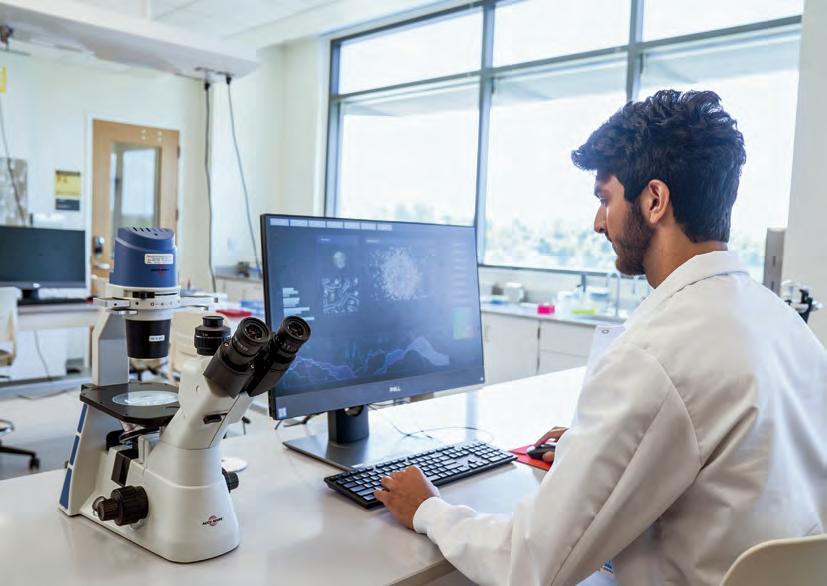
university’s environmental science and management program. “The courses in our program cover everything from hazardous substances and toxicology to risk assessment to ergonomics to incident response. You can imagine that with increasing extreme weather, such as hurricanes, as well as concerns about workplace health, these courses are relevant to a diverse set of organizations and roles in these organizations.”
Fu said that learners will complete assignments modeled after real-world management scenarios, with the goal of helping them build a virtual portfolio that includes elements like hazard communication programs, human health
or ecological risk assessments, emergency and business continuity plans, life safety and fire prevention plans, worker training programs, environmental management system audits, and more.
Students who wish to earn a Master of Business Administration (MBA) also have a new option available, with the university introducing a 30-credit degree that can be completed in as little as 15 months and at a lower out-of-pocket cost, while also offering new levels of service and support. The program is accredited by the International Accreditation Council for Business Education (IACBE), which requires institutions to follow a process of continuous qual -
ity improvement that builds learner competencies and prepares them for professional success.
“The UMGC School of Business is focused on student success, and our updated MBA program considers our students come from diverse and varied backgrounds,” said Dr. Pam Carter, portfolio vice president and dean of UMGC’s School of Business.
“We have designed our MBA to meet students where they are by providing the tools to create a personalized study blueprint for each student, in each course. Each study blueprint provides just-intime supplemental materials for when students may find they want additional support in a specific course.”
In addition to the instructors teaching their courses, Carter said, students in each course will be assigned to a faculty member as a separate resource to assist with supplemental materials. The personalized study blueprint, called Preflight, results from a self-assessment tool that students will use at the beginning of each MBA course. It identifies areas of support each student may need or want to strengthen their studies.
Christina Mundy, a recent graduate, praised the program for being “project based, making it very relevant to the global professional environment, forcing you to work in teams and accomplish tasks by working with people all over the world.”
Finally, driven in part by the increased demand for counseling services that arose during the COVID pandemic, UMGC will roll out a new MS in Clinical Professional Counseling in the fall of 2024, designed to meet the growing need for professionals prepared to enter counselingrelated work as licensed practitioners in community and business settings.
The program will prepare graduates to work in a variety of settings, including mental health centers, drug and alcohol treatment programs, correctional institutions, healthcare settings, social service agencies, private practice, and business and industry. It is aligned throughout with UMGC’s institutional
learning goals of providing career-relevant education and developing capacity for lifelong learning and growth, which are essential in the continuously evolving field of professional counseling.
University of Maryland Global Campus (UMGC) awarded 10 new Pillars of Strength scholarships in 2023, covering tuition and fees for the caregivers of injured, ill, or wounded military servicemembers.
A total of 69 scholarships have been awarded since the program began in 2013, and for the first time, the recipients included four men who act as caregivers for women veterans—a trend that is likely to continue as more
women serve in combat roles.
“Caregiving is not only provided by women,” said Rich Blewitt, CEO of the Blewitt Foundation and founder of the Pillars of Strength program. “That two husbands, a brother, and a son were awarded the scholarships shows that caring for wounded veterans truly is a broader responsibility among family, friends, and loved ones, and they all deserve our support.”
The Pillars of Strength scholarships recognize the sacrifices made by caregivers, many of whom devote years of their lives—and careers— to caring for loved ones or friends. These caregivers receive few if any federal education benefits, yet many are also their family’s primary wage earners, and the scholarship covers all expenses related to their chosen degree program, no matter how long it takes to complete.

“I am proud of my service as a full-time stay-at-home caregiver for a disabled veteran,” said Scott Lynch, who quit his full-time job in 2012 to care for his wife, Monica, and their two boys. He is using the scholarship to pursue an MBA with the goal of establishing a business that builds on his undergraduate background in environmental engineering.
“The feeling is just overwhelming, inspiring,” he said upon learning that he had been named a scholarship recipient. “You exist in these spaces as a volunteer caregiver for so long you begin to feel a little lost. . . . I was overwhelmed with joy and the feeling that somebody is on your side and there is a group of people that hear you, see you, recognize you, and are rooting for you.”
While most recipients use the scholarships to earn bachelor’s or master’s degrees, one of this year’s recipients, Angela Cooper, plans to use her scholarship to earn a doctorate—a lifelong dream she would otherwise never be able to afford.
A surprising number of recipients say that their goal is to use their UMGC degree to give back, often by supporting other caregivers or disabled veterans. Pillars of Strength recipient Lauren Fagan and her husband Osee said that they worked their way up “from rock
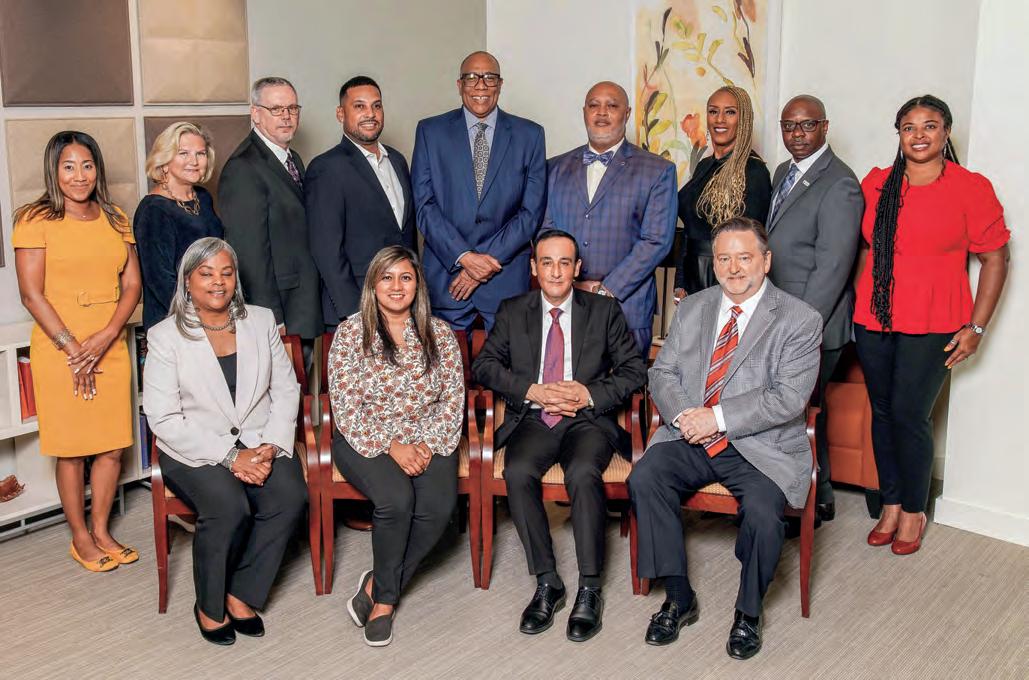
Seated (left to right): Kristin Coleman ’93, Najila Ashan ’22, Dr. Frank Musmar ’11, and Norman Workman ’87 Standing (left to right): Bernetta Reese ’21; Dr. Tulinda Larsen ’13; Jim Payne ’10, ’13, & ’14; Gustavo Hinojosa Jr. ’16, ’17, & ’19; Vernon Herron ’00; Dr. S. Raschid Muller ’10, ’12, & ’13; Laurie Sayles ’10 & ’11; Kenya Dugger ’12 & ’14; and Dr. Stacy Trammell ’03 & ’08. Not pictured: Tiana S. Clark ’04, Margaret Larkin ’17 & ’18, and James Muldoon ’66.
bottom” to create a nonprofit, Operation Barnabas, which assists wounded veterans who are struggling with drug and alcohol abuse that often leads to suicide. Because they have suffered so much themselves, the Fagans said, they believe they have the credibility to reach fellow sufferers.
Meet with
on UMGC Day, February 19
The Maryland General Assembly issued a resolution designating Monday, February 19, 2024, as University of Maryland Global Campus (UMGC) Day. The resolution
cited “the contributions and legacy of UMGC students, faculty, staff, and alumni in Maryland and around the world.”
UMGC President Gregory Fowler and alumna Patricia Toregas ’84 & ’91 were presented the resolution in Annapolis by both the Maryland Senate and the
House of Delegates. In addition to being a UMGC graduate, Toregas is a faculty member and past president of the UMGC Alumni Advisory Board. In their introductions to the UMGC Day resolution, both chambers of the legislature noted UMGC’s 75-year history of providing educational

services to the U.S. military around the world, as well as its commitment to adult learners.
“Our global community is extremely proud to be recognized for a mission that continues to drive our service, passion, and innovation to educate those in
Maryland, in the military, and beyond,” said Fowler.
“We thank Senate President Bill Ferguson and House of Delegates Speaker Adrienne Jones for their leadership in making this special day happen and for their dedication and service to all Marylanders.”
The day began with alumnus and current student Robert Parada ’23 and alumna Dr. Stacy Trammell ’03 & ’08 meeting with Delegate Jared Solomon, who represents District 18 in Montgomery County. Parada and Trammell shared why they attended UMGC and the

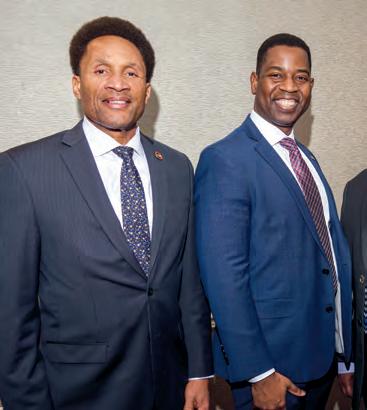
effect that education has had on their career journeys.
Parada is executive team leader of Human Resources for Target, while Trammell is president and CEO of Zuna Eclipse, LLC, of Glenn Dale, Maryland, which offers intelligence analysis and enterprise information technology support services.
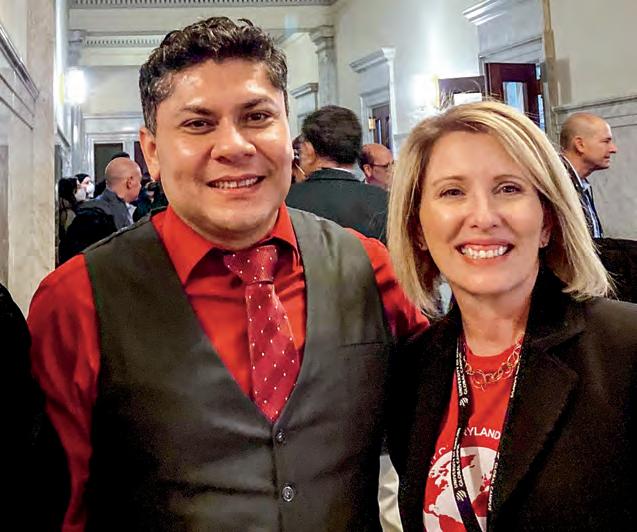
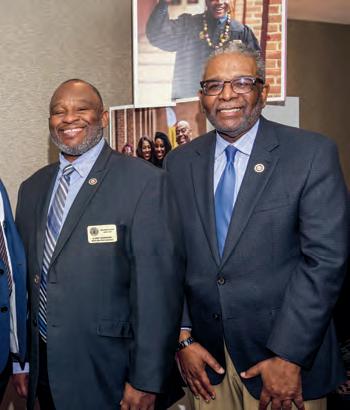
Parada shared how UMGC provided a flexible schedule, allowing him to complete a certificate in Human Resource Management that positioned him to advance in his career at Target while still finding time to spend with his wife and young daughter at home.
(Far left) Patricia Toregas '84 & '91 and UMGC President Gregory Fowler hold the House and Senate resolutions as other UMGC representatives look on. (Above, left to right) Dr. Stacy Trammell '03 & '08, Robert Parada '23, and Nikki Sandoval, UMGC's associate vice president for Alumni Relations. (Left, from left to right) Maryland Senator Arthur Ellis, UMGC President Gregory Fowler, Maryland Delegate Gary Simmons, and Maryland Delegate Greg Wims.
working full time and raising two children.
Parada and Trammell also met with a senior staffer from the office of Delegate Jazz Lewis—who represents District 24 in Prince George’s County and currently serves as House Majority Whip— sharing how UMGC supports Maryland adults as they pursue their educational goals.
Afterwards, more than 70 individuals—including five senators and 14 delegates—came together at a special reception celebrating the UMGC Day resolutions, then walked together to the Maryland State House to hear the reading of the UMGC Day resolutions.
The National Security Agency (NSA) Program Management Office has validated UMGC as a National Center of Academic Excellence (CAE) for its cybersecurity programming.
the high quality of our cybersecurity-related programs,” said Helen Barker, UMGC’s cybersecurity department chair. “We are very excited to add the MS in Cybersecurity Technology to the list of designated programs.”
The CAE designation is awarded to regionally accredited academic institutions that offer cybersecurity-related programming, including degrees, majors, minors, and certificates at the associate, bachelor’s, and graduate levels. An applicant institution must show significant community involvement, academic activities, and institutional practices in cybersecurity, as well as have one or more programs of study under consideration that meet the CAE requirements. Since April 2002, the U.S. Department of Homeland Security and the NSA have consistently designated UMGC as a leader in cybersecurity education.
Trammell shared how her education helped prepare her to start a thriving Maryland business that provides jobs for Maryland residents. After she transitioned from military to civilian life, UMGC’s flexibility allowed her to earn her master’s and doctorate while
The prestigious validation—of UMGC’s MS in Cybersecurity Technology— runs through the 2029 academic year and is the second the university has received. In 2022, its MS in Cybersecurity Management and Policy was also recognized as a validated program of study with the NSA and the U.S. Department of Homeland Security.
“Continued recognition of our areas of study through the National Centers of Academic Excellence process validates
“NSA’s program of study validation process encompasses a rigorous review of our program,” said Dr. Loyce Pailen, senior director of the Center for Security Studies at UMGC. “Our dedicated faculty team—including Dr. Patrick Appiah-Kubi, program director and associate professor of Cloud Computing and Cybersecurity Technology; Dr. Lawrence Awuah, collegiate professor of Cybersecurity Technology; and Eser Valencia, academic program coordinator—provided months of support, which was invaluable to our success.” F

F o r some 75 years , UMGChasintroduced American culture and classroomstopopulations
ed States , evenasothercultures have shaped the way the institutionoperatesathome and a broaBY GIL KLEIN
F One day last term, Frank Concilus—who has taught for UMGC in Asia since 1974—took his 10 students to one of Seoul’s main temples. They wrapped themselves in robes and, for much of two days and a night, meditated and took part in the temple’s ceremonies. Early in the morning, he was surprised when they all showed up for a service in the main Dharma Hall. F Some of his students call Concilus “Mr. Culture,” and Concilus embraces the role, working to introduce American servicemembers to Korean culture and history while simultaneously introducing American culture to Koreans. F “It’s possible [for military personnel] to come to Korea and never leave the base,” Concilus said. “But these younger troops certainly like to eat Korean food, and they are drawn to the K-pop mecca in Korea.” F Similarly, the young Korean servicemembers assigned to the base who take his classes also want to get to know Americans.

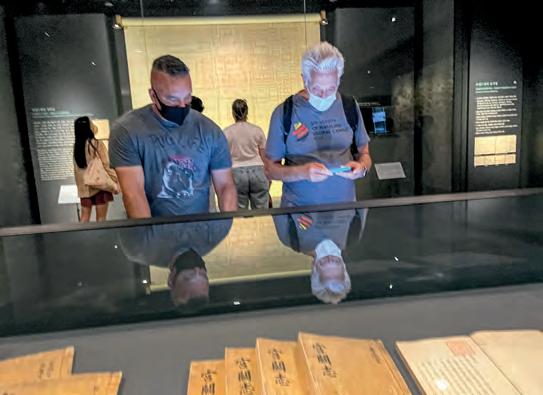
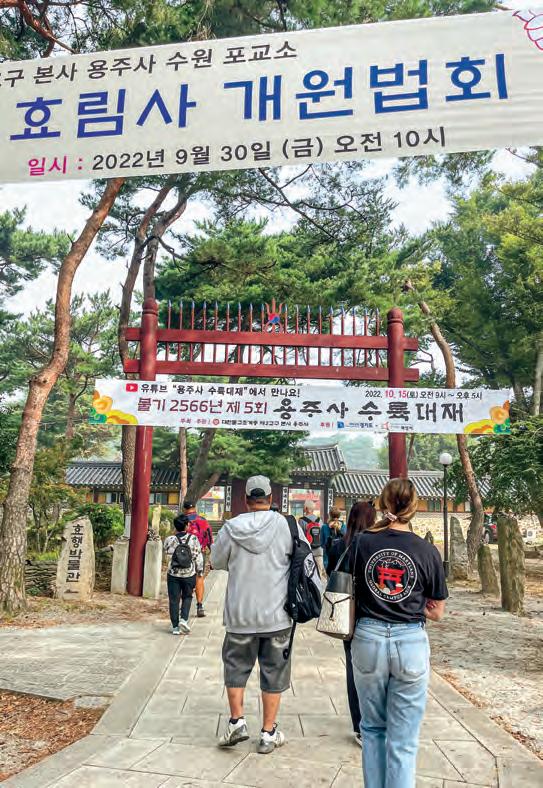
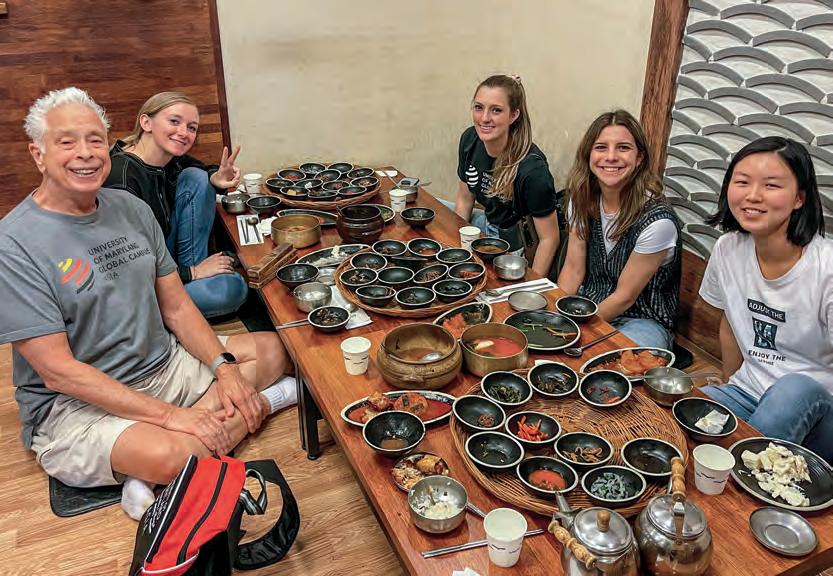
On a field trip to Hwaseong in Korea, UMGC professor Frank Concilus takes students to the 17th-century Yongiu-sa temple built by King Jeongjo. They also visited the royal tombs of Prince Sado and King Jeongjo and their wives, and toured Suwon City and the Hwaseong fortress, also built by King Jeongjo. (Clockwise from top left) Viewing a Buddhist hall in the Yongju Temple; walking into the temple; enjoying a traditional Korean meal in a restaurant near the Royal Tombs; and visiting the fortress museum.
With encouragement from NATO, the U.S. military is expanding its presence in Poland and Romania, building what will be major bases. Consistent with the university's historic tradition of service to the military, UMGC is following the expansion, poised to provide education opportunities to servicemembers assigned to the new bases. United Kingdom
Organized out of UMGC offices at the Kaiserslautern military community in Germany, the university conducts field studies programs for military students and their dependents from all over Europe, with a professor leading visits to historic and cultural sites, immersing them in the lore of each location and introducing them to local people and customs. Among places visited are: Rome, Madrid, Naples, Venice, Nuremberg, and Pompeii as well as the site of the Battle of the Bulge in Belgium and Luxembourg
To alleviate tension between Okinawans and Americans in the late 1980s, UMGC created the Bridge Program, offering English language classes to Okinawans. Jackie Cillizza, the program manager, says it transforms the lives of Okinawans and jump-starts their higher education.
With tensions high in the Middle East, UMGC’s Jackie Wilson, who works with American service personnel at Saudi Arabia’s Prince Sultan Air Base, brings in specialists in Saudi culture to teach the students about Saudi traditions.
The groups begin to socialize during their time off, Concilus said, the Americans learn more about Korean culture and start to recognize Seoul as a vibrant city—though likely very different from their own hometowns—and soon a real cultural exchange emerges.
This process plays out across the university, in different ways and in different settings, shaping how the institution operates and its impact on students and employees alike.
This sometimes comes as a surprise to those who think of UMGC as an online university. And while it is true that UMGC was an online pioneer, it also maintains a robust and long-standing relationship with the U.S. military, under contract with the U.S. Department of Defense, teaching American military personnel on bases around the world, with more than 175 locations in more than 20 countries and territories.
“ UMGC has to engage with various cultures around the world,” said President Gregory Fowler. “Our faculty, staff, and students go into cultures that are different. We engage with people who see the world differently, and who may not even always like us.”
SEOUL,
Prof. Frank Concilus takes his students to one of the major temples in Seoul to help them understand Korea’s religion and culture. He introduces them to Korean servicemen in his classes and encourages the Koreans and Americans to socialize.
Few if any other universities must contend with natural and manmade disasters as a matter of course, nor must they navigate them without long-term operational gaps, moving instructors and staff on short notice as military forces deploy around the world.
As part of its everyday operations, the university acts as an ambassador to those countries while promoting cultural understanding among its American students.
This is a reality that dates back to 1949, when the University of Maryland answered the call of the Defense Department to send instructors abroad to teach American troops in postwar Europe, thus immersing the university in world cultures and the flow of international events.
“UMGC has to engage with various cultures around the world,” said President Gregory Fowler. “Our faculty, staff, and students go into cultures that are different. We engage with people who see the world differently, and who may not even always like us.
“So, as the university moves around the globe with U.S. forces, we have to think about how to promote American culture and life while at the same time respecting the cultures and lives of the people in the countries where we operate.”
For U.S. servicemembers and their families, being stationed on a military base overseas may be their first experience of being outside of the United States or even outside of their home state, said Lloyd “Milo” Miles, UMGC’s senior vice president for Global Military Operations. Often, they know little or nothing about the country in which they are called to serve.
“When they get on the ground, we are providing classes in the history, culture, and languages of the places they are assigned, and most of the places where they will be assigned,” Miles said.


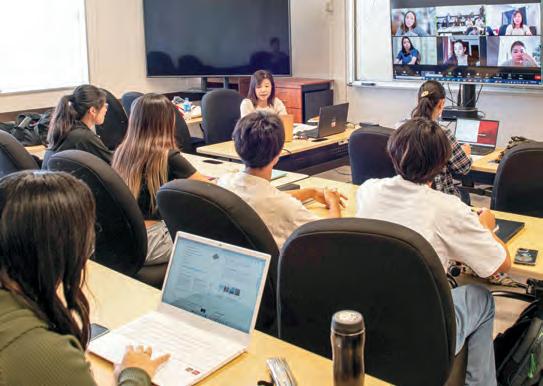
(Above, top) Okinawan Bridge Program students celebrate completing the year-long program; (above, middle) UMGC students with Frank Concilus and Korean folklorist David Mason; (above, bottom) a blended format class at Camp Foster in Okinawa allows students to participate in person or via Zoom; (top right) a shaman performs a ritual dedicated to the Mountain Spirit during a field trip to a Shaman Festival at the Geumseong Shrine; (middle and bottom right) Bridge Program students vary in ages and backgrounds but share the objective of learning English at an American university.

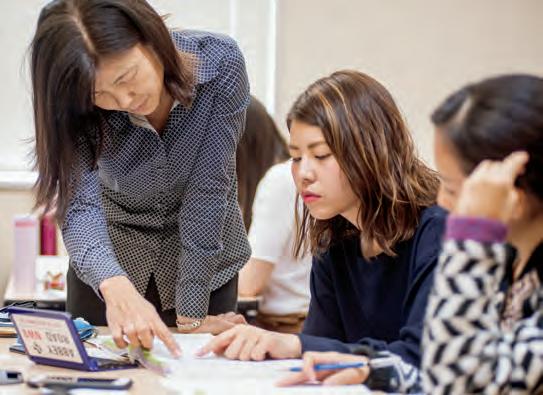
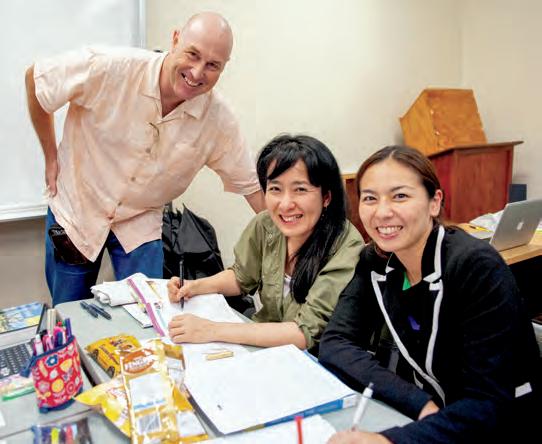
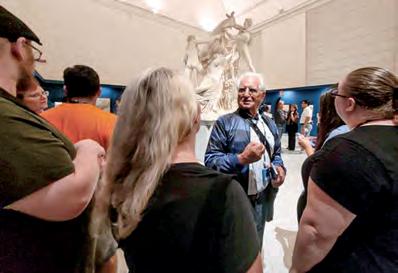
(Clockwise from above) Professor Enzo Milano with the Naples Field Study class visits the National Archaeological Museum of Naples, admiring the famous sculpture Toro Farnese; Naples Field Study students enjoying lunch at a local trattoria in the uphill neighborhood of Vomero; the Naples Field Study class at the amphitheater in Pompeii, the oldest known from Roman times, which could hold up to 20,000 spectators.
“It’s beneficial for our U.S. servicemembers to be the good face of the United States when they’re out there amongst the local nationals if they’ve had some of this education and training,” he said. “The other side of the coin is that it provides local nationals with a different perspective of the U.S. military personnel and U.S. citizens, as well, because there can be a lot of misunderstanding, in some cases, between the two nationalities, often for historical reasons.”
In Okinawa, for instance, distrust between the Okinawans and the thousands of U.S. military on bases all over the island was so great that, in 1987, UMGC launched what is known as the Bridge Program, offering English language classes to Okinawans as a way to begin their college education.


The U.S. State Department now provides 10 scholarships a year to Okinawans who have completed the Bridge Program to come to the United States or to keep studying in Okinawa to complete their university education. Most choose to stay with UMGC.
“Many come back and thank me,” said Jackie Cillizza, the Bridge Program manager on Okinawa. “They tell me, ‘My world changed. Once my English became stronger, it changed everything. It changed how I look at the world. It changed how I thought. It just changed who I was.’”
Hinako Takahashi-Breines, a UMGC instructor who teaches English in the Okinawa Bridge Program, said one of her students was so intent on becoming fluent that, after class, she reserved the classroom and put up a sign inviting Americans to come in and talk to her.
She provided a snack and brought a United States atlas to
serve as a conversational icebreaker. She would ask the Americans what state they are from and then open the atlas and get them to talk about home.
“The people coming in to talk to her are curious, and some of them want to learn Japanese,” Takahashi-Breines said. “So, it’s like a language exchange.”
The Bridge Program is also open to American soldiers and their families for whom English is not their first language, said William Stevens, associate director of Enrollment Operations in Asia.
“It’s really become a cultural mix where we have students from South America, from East Asia, from Eastern European areas, and from Korea and Japan,” Stevens said. “It’s been really cool.”
On the other side of the world, Regional Director Mitzia Williams oversees 11 sites throughout the Mediterranean, including Spain, Turkey, Greece, Portugal, and now Romania. To
The Hadyyah Organization, which specializes in reaching out to Westerners to teach about Saudi culture and life, encourages students to dress in authentic local attire and introduces them to camel riding and falconry, integral parts of Saudi culture that date back centuries.
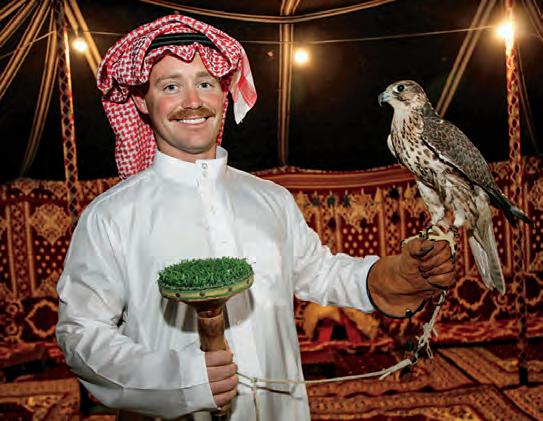



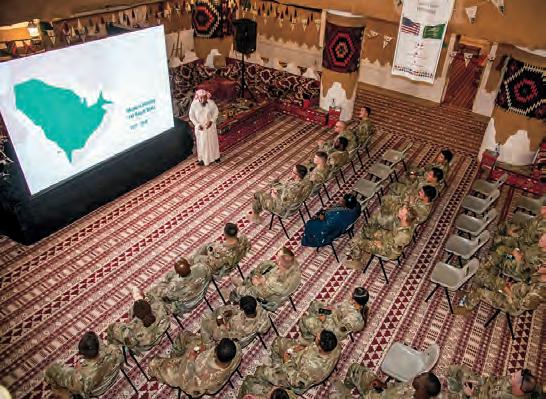
(This page) To teach U.S. troops stationed at Prince Sultan Air Base about Saudi life, UMGC Program Coordinator Jackie Wilson, with camel, unites with a visiting group of Saudi cultural ambassadors, known as Hadyyah. (Right) Wilson and students commemorate Martin Luther King Jr.’s birthday.
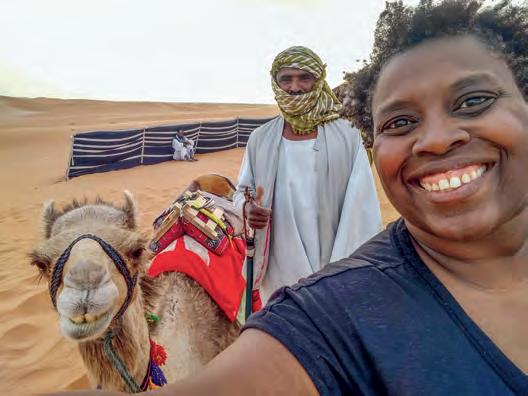
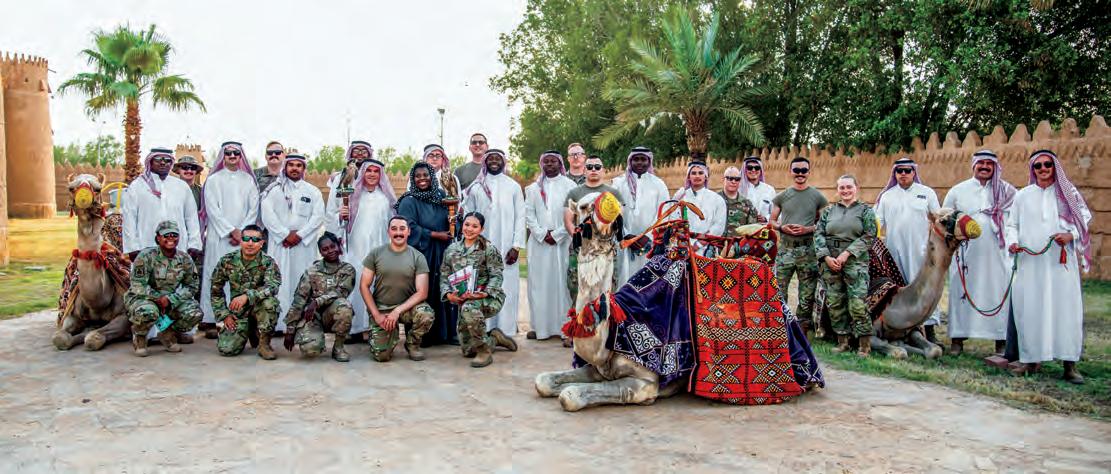
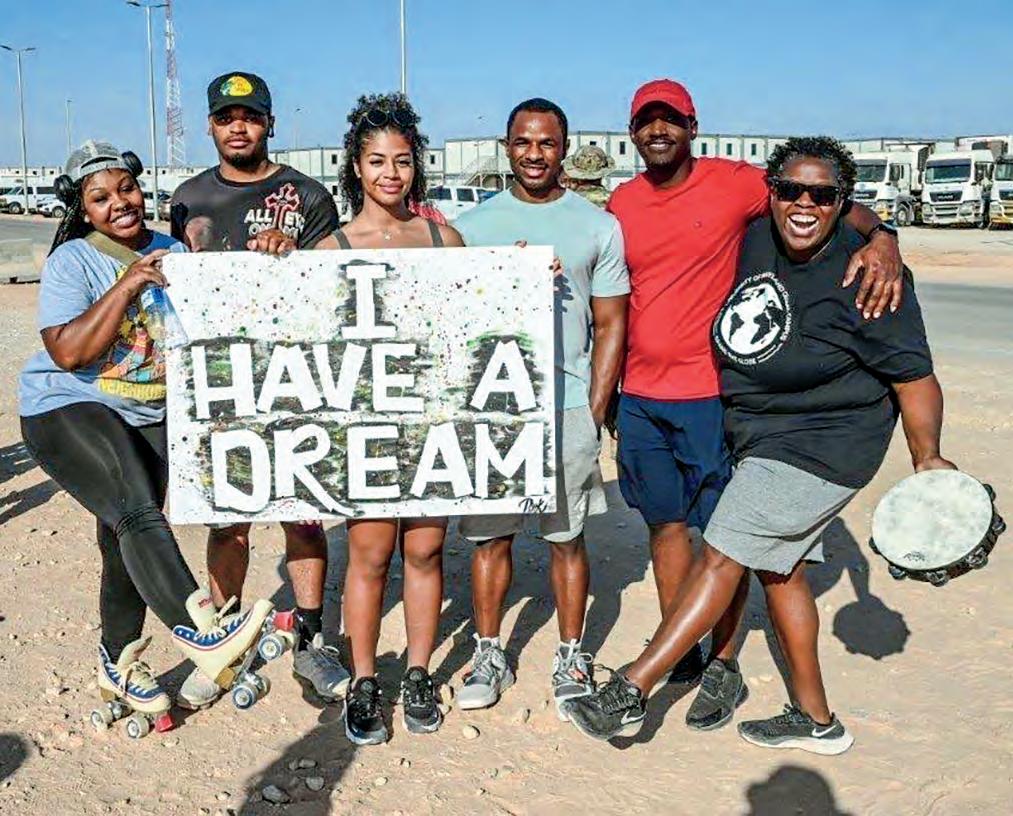
get the students out into the community and immersed in the culture, UMGC has launched a field studies program for students taking language and culture courses.
Students from all over Europe meet in one city—Rome, Naples, Venice, or Nuremberg. They spend several days living in the city and interacting with members of the local community.
“It’s very condensed, but they learn so much, like a mini study-abroad program,” Williams said. “But it’s not just tourists visiting. Faculty members conducting the trips have a deep knowledge about the language, history, and culture of what they are seeing. Along with learning the culture, the students get to meet with more local people. It has a huge impact on them.”
Military family members also participate, including high school-age children, who may wish to learn more while in Europe and perhaps to earn general education college credits that they can transfer when they go to college back home.
“They can actually take that experience of being in Venice, in Naples, in Madrid, and take it with them to the university they are going to [attend],” said Patricia Sanchez, associate director for Enrollment Operations for Europe and Downrange. “They are never going to get that unless they do a study abroad, and they are already here. So, why not do it here?”
This process plays out across the university, in different ways and in different settings, shaping how the institution operates and its impact on students and employees alike.
Cultural opportunities like these are part of UMGC’s DNA, as it constantly packs up and moves personnel to serve U.S. forces wherever they are deployed around the world, and since the Vietnam War, this has included active war zones.
That can lead to some predictably tumultuous experiences.
In Saudi Arabia, for instance, UMGC is reestablishing its presence at the Prince Sultan Air Base, where Jackie Wilson, a program coordinator, gave a virtual tour of the large Quonset-style tents that make up the university’s facility in the middle of the desert. Inside the tent, the loud whir of the air conditioning can make talking difficult.
“Right now, we are in an expeditionary environment, so this looks temporary,” said Wilson, who had arrived at the air base 10 months before, shortly after joining UMGC. “You have to make do with what you have here. We’re just using our technology to make the most of it.”
Wilson was not new to Saudi Arabia, having taught Saudi women basic English at a technical college since 2017, and she knew a lot about the Saudi culture—as well as about what happens when the hot spring season transitions to the even hotter summer, generating intense dust storms that include rain and hail.
“We were in the testing center,” Wilson said. “There had already been dust storms for a couple of days when it started to rain, and [at first] it was little bitty drops until it started coming down, bam, bam, bam, bam. The rain just started coming very deep, very strong and small hail balls came along with it. We
“ Many come back and thank me,” said Jackie Cillizza, the Bridge Program manager on Okinawa. “They tell me, ‘My world changed. Once my English became stronger, it changed everything. It changed how I look at the world. It changed how I thought. It just changed who I was.’”
were in this tent, and the ground is literally the ground. The water has nowhere to go, so it flooded the tent, destroying tables [and] desks. It was just mud.”
That is when UMGC’s president showed up to see how things were going at the new installation. Wilson greeted him with her trademark grin. Things were going great.
Given the current tension in the Middle East, American military personnel are not allowed to leave base to learn about Saudi culture, Wilson said, and Saudis are not allowed to take classes on base.
That means that Saudi culture must be imported, and a visiting group of Saudi nationals provides that.
“They teach [students] about Saudi culture, and then they give them an opportunity to dress in traditional Saudi clothing,” Wilson said. “They relax in a Saudi majlis tent—a traditional communal sitting area—where they try Arabic coffee and different teas that are made Arabic style. And, they learn to ride camels.”
Wilson said she also uses her own knowledge of Saudi culture to help explain it to the airmen and GIs as they do their rotation at the base.
“I have lived in it,” she said. “I also lived in Kuwait during the pandemic. So, I have a good understanding of Saudi and Arab culture.” She said that she hopes that soon, tensions will ease enough for students to venture off base and learn about the culture on their own by visiting nearby towns.
Similar interactions happen around the world. As the U.S. military establishes bases in Poland and Romania to boost NATO defenses, UMGC is right behind them. Patricia Coopersmith, vice president and director of UMGC Europe, based in Kaiserslautern, Germany, has to work out the details to make that happen—working with government representatives to find classroom and office space, hiring professors and staff, and getting ready to promote the benefits of a UMGC education to incoming service personnel.
In Poland, Coopersmith said the U.S. government is preparing buildings to serve as education centers, and UMGC will have staff
“ Faculty members conducting the trips have a deep knowledge about the language, history, and culture of what they are seeing. Along with learning the culture, the students get to meet with more local people. It has a huge impact on them.”

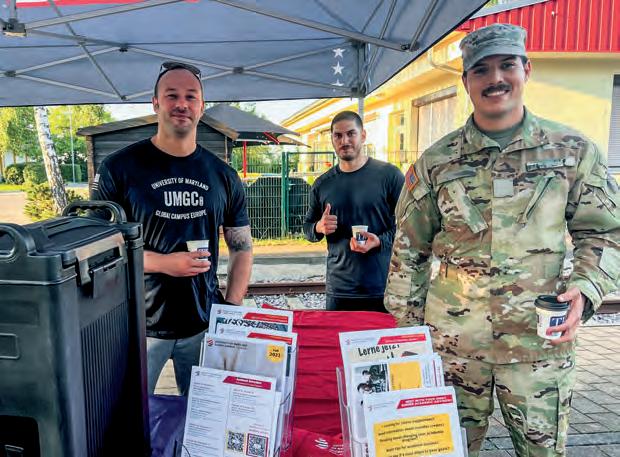
there when they are ready. At Powidz in particular—which will become the hub of U.S. base operations in Poland—work is well underway to expand facilities there and at 11 base camps throughout the country, making Powidz a major hub for UMGC as well.
When she heard that troops stationed in Maine were heading to Poland, Coopersmith set up a “Polish Jumpstart” webinar that explained the geopolitics, society, culture, and history of Poland. It also helped inform incoming troops about what UMGC can do to advance their education and explained how they could start courses while still in Maine and continue their studies when they get to Poland.
“We had one of our professors do a little intro to Polish—a couple of key phrases, a couple of words: hello, goodbye, please, thank you—and also talk a little bit about the culture. So, when [students] do land in Poland, they [will] know a little bit about what to expect to see out in the local community.”
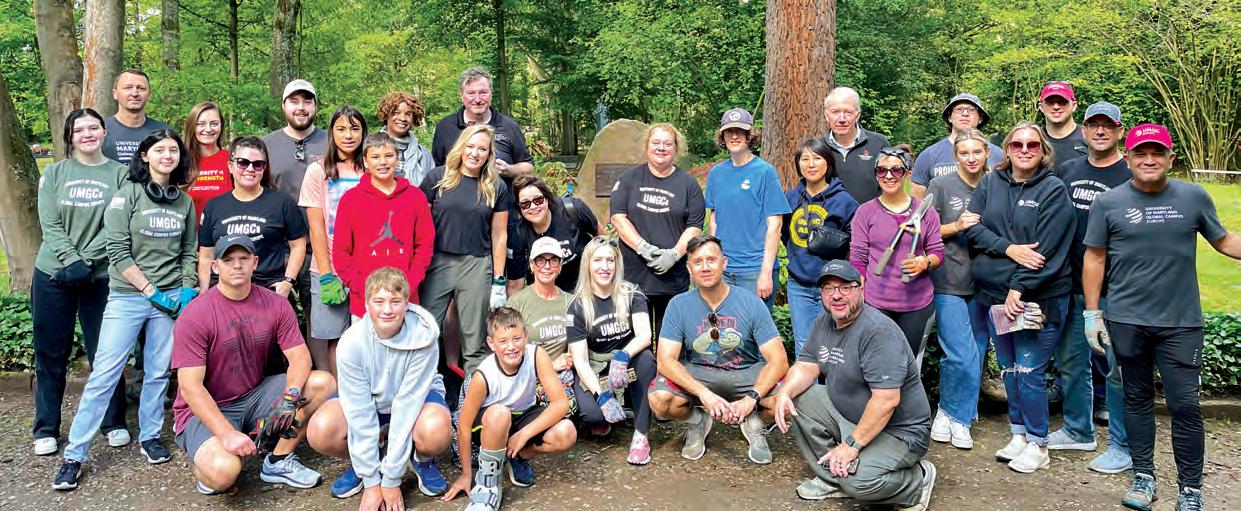
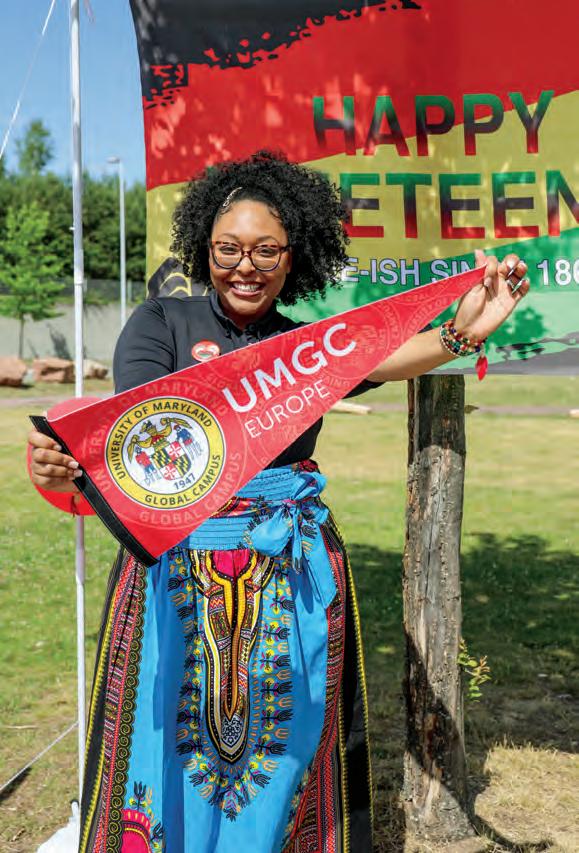
(Clockwise from top left; left to right) Marimar Vinas, Nicole Brickley, Leonardo Martinez, and Mariah Kennedy begin an MBA class at Kapaun in Kaiserslautern, Germany; UMGC Europe’s community service day annual cleanup at the American Kindergraves in Kaiserslautern, where 451 American infants, who passed away between 1952 and 1971, are buried; celebrating diversity, Logistics Supervisor Robyn Scott joins the Juneteenth kickoff at Ramstein Air Force Base; Senior Testing Military Education Coordinator Edward Martin joins forces with USO United for the “Wake Up Wednesday” event in Ansbach, Germany, serving coffee, education, and camaraderie.
In Romania, Coopersmith has the help of a staff member who is a Romanian citizen who accompanied them to take an initial look at where American forces will be stationed. But, as is so often the case when UMGC follows the military, it will ultimately depend on the base commanders and how much emphasis they want to put on education.
UMGC’s challenge today is the same as it has been since the first professors arrived in Europe in 1949.
“We have to operate around the U.S. military’s mission,” Coopersmith said. “If we find out a group was supposed to be sent, say, down to the Middle East, and then they are not arriving for another couple of weeks, we have to adjust our classes around that. We have had soldier students who have gotten unexpectedly sent from England to Poland or Romania. We have to say, ‘Okay, well, you are not going to be sitting in my classroom anymore, but here is the Zoom link so you can participate virtually.’”
President Fowler summed up UMGC's international mission this way: “No other institution can say, ‘We have literally gone across seven continents and almost every topography to help students gain their skills,’” he said. “UMGC has never been a traditional university. Our success has been defined by our ability to figure it out. We are going to go wherever we need to go to meet these students’ needs.” F

For UMGC, which leverages technology to expand access to underserved populations, artificial intelligence represents an exciting—and sometimes perplexing—new quantity. Approaching AI as a partner opens the door to a promising future.
BY MARTINA HANSEN, KRISTOPHYRE MCCALL, AND DR. MICHAEL PROKSCHUNIVERSITY OF MARYLAND GLOBAL CAMPUS (UMGC) HAS LONG BEEN AN EDUCATIONAL INNOVATOR. Now, by approaching artificial intelligence (AI) as a partner, the university is at the forefront of an educational renaissance, poised to change the way students interact with the institution, acquire knowledge and skills, and navigate their careers. F In other industries, AI has already reshaped operations. In healthcare, it is used to predict patient outcomes, personalize treatment plans, and accelerate drug discovery. In finance, it is revolutionizing how clients manage and invest money, with algorithms that predict market trends and automate trading, offering insights that were previously inaccessible to human analysts. In the automotive industry, AI is the driving force behind autonomous vehicles. F While its potential is exciting, AI’s role in higher education has yet to be clearly defined. However, this much is clear: We will squander AI’s true potential if we treat it as a general-purpose technology or only apply it in isolated situations. Therefore, UMGC is looking beyond short-term implementation, with the goal of defining and applying AI as a collaborative partner in its university community.
At UMGC, institutional leaders are shaping a future where AI supports and also significantly improves the personal and professional lives of students, faculty, and staff.
What does this mean in practical terms?
Currently, the university leverages AI to enhance the services it offers. As a global institution focused on adult and military learners, it is crucial that UMGC provide around-the-clock support that is conveniently accessible. This requires flexibility and a variety of communication channels, and AI currently powers a chatbot that can offer learners personalized information and answers to questions, saving them a call to support. It can also deliver e-mail at the time the learner is most like to see and open it.
Now the institution is focused on expanding those capabilities, from sending timely reminders about things like project deadlines or FAFSA application dates, to helping navigate the online classroom or find federal resources. This represents more than logistical support; some learners may be apprehensive about asking for help from support personnel out of fear that they will be judged or misunderstood. AI can offer a nonjudgmental platform.
Most UMGC students come to the university with specific goals—perhaps career advancement, launching a new career, achieving a personal milestone, or something else altogether. Faced with an array of options, including credit or noncredit learning experiences, multiple start dates, different learning modalities, and different locations, it can be daunting for them to map out a pathway that promises to lead them to
“ AI—tailored to both understand and accommodate his learning preferences, career goals, and personal interests—will enhance the work of the university’s academic advisors. It will help recommend courses, sequences, and learning experiences, working alongside faculty to aid Stephen in acquiring knowledge more quickly and effectively by aligning with his specific style of learning.
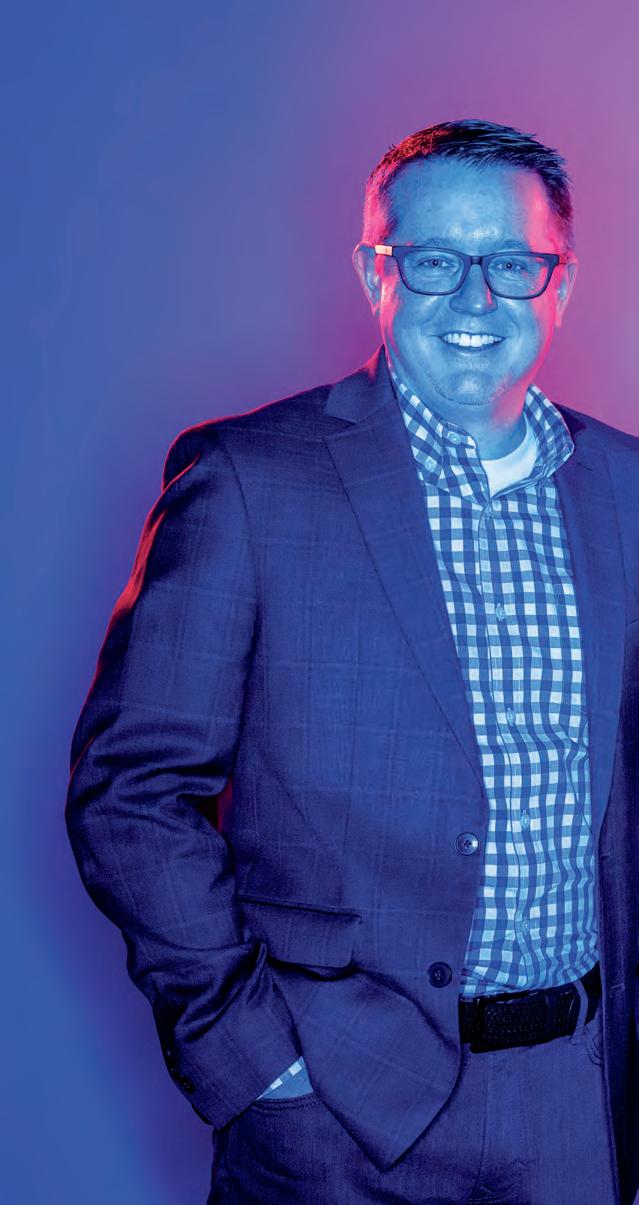
the desired outcome. UMGC’s objective is to help those learners reach their goal in a timeframe that works for them while incurring the least amount of debt.
Let us consider the case of Stephen, a potential student. In the near future, AI will help UMGC team members provide him with personalized guidance as he continues his learning journey. AI—tailored to both understand and accommodate his learning preferences, career goals, and personal interests—will enhance the work of the university’s success coaches, military education coordinators, and other advising staff. It will help recommend

courses, sequences, and learning experiences, working alongside faculty to aid Stephen in acquiring knowledge more quickly and effectively by aligning with his specific style of learning.
AI might also identify a more focused and effective educational journey, offering support when a student prefers to self-service or late at night, when support staff aren ‘t readily available. Looking farther down the road, AI that has been integrated with augmented or virtual reality could offer Stephen immersive learning experiences that are especially effective in fields like science, history, or language studies.
In short, for UMGC, AI is evolving beyond a simple technological tool; it is becoming an integral partner in the university’s
decision-making processes, expanding the institution's capacity to serve students better.
UMGC is no stranger to innovation, having helped pioneer online education globally, and its public mission underscores a commitment to adult learners. Thus, institutional leaders support expanding the horizons of AI innovation, ensuring that AI helps build stronger connections between students, team members, and AI itself.
At the same time, university stakeholders are extending the application of AI into administrative and operational realms, streamlining processes to improve efficiency and effectiveness. By incorporating AI into these areas, the objective is to optimize
“
By harnessing data in novel and insightful ways, the university can gain a deeper understanding of its students, what they bring to the classroom, and their aspirations, and equip teams to support them.
vider of knowledge and collaborator in shaping a comprehensive vision. It is the human capacity for wisdom that must guide the utilization of AI to achieve significant and purposeful results.
It is reasonable and necessary to take a cautious approach. AI systems are only as unbiased as the data on which they are trained, and if the training data contains biases, AI can perpetuate or even amplify them. This is a significant concern in areas like hiring, law enforcement, loan approvals, and education, where biased AI could lead to unfair or discriminatory outcomes.
resource allocation, enhance decision-making, and look for ways to automate routine tasks, which in turn allows the organization to focus on more strategic initiatives and team members to focus on students or their own professional development. This holistic approach underscores UMGC’s dedication to excellence in education, operational agility, and the overall enhancement of the institutional ecosystem.
Discussions about AI often refer to its foundation in machine learning, which uses extensive historical data and computational power to assist or sometimes even automate human decision-making. But what are the broader implications of this technology?
The work of Russell L. Ackoff, a professor at the University of Pennsylvania’s Wharton School, is helpful in better understanding AI's full impact, drawing on his concepts about systems thinking. Although his observations are decades old, they remain relevant today.
While AI shines in its ability to combine historical data and information to accumulate knowledge in a way that drastically outperforms most human capabilities, Ackoff identified a gap: Machines lack the capacity to understand the value of knowledge, as well as the ability to generate wisdom. Wisdom, according to Ackoff, involves a deep understanding of the longterm outcomes of our choices while maintaining a focus on the bigger picture, thus contributing to development and an increase in potential and value. It involves strategic foresight, an orientation towards the implications that current actions may have for the future. In contrast, knowledge that is accumulated by machines is a record of what has already occurred, a database of historical information with the ability to improve efficiency, but not effectiveness.
The current challenge, then, is to reimagine the role of AI, applying wisdom and envisioning the future of education, and within that framework, defining how to implement AI as a pro-
One of the most discussed risks is the potential for AI to automate jobs, particularly those involving routine, repetitive tasks. While AI can create new job opportunities, the transition could be challenging for those whose skills are made redundant by AI.
As we seek to understand AI’s potential and value, there are recent advances that offer useful context and can help guide an intentional approach to understanding and applying emerging technologies.
1 The Personal Computer (PC): Before PCs democratized access to computing, computers were large, expensive, and accessible only to businesses and universities. Similarly, AI is transitioning from an exclusive, high-end technology to something more accessible. Just like PCs, AI is becoming an integral part of everyday life.
2 The Internet: The internet connected our world in ways we had never seen before, transforming access to information and global communication. AI can be seen as the next step in that evolution—not only connecting information but also understanding, processing, and generating it. It is like going from a vast library where you had to search for information manually to one where a smart assistant instantly brings you exactly what you need.
3 The Smartphone: Smartphones made computing power pocket-sized, changing the way we communicate, access information, and interact with the world. AI is becoming similarly pervasive and personal. It is already in our phones, homes, cars, and workplaces, and it is reshaping how we live, work, and interact with our environment. There is no longer any need to carry individual calculators, cameras, video recorders, or audio devices; all of those are now a single device in our pocket. In the process, whole industries have been restructured. Now, for example, we no longer need to purchase a full album when we only want to hear one song, and this has forever changed the musical ecosystem.
AI is poised to bring similarly profound changes, driving a fundamental shift in how we handle information, make decisions, and interact with technology. In summary, AI is not just a new tool; it is a new way of thinking about problems and solutions.
Already, AI is being used in innovative ways and making an impact across industries. In healthcare, its capacity to tailor treatments for individuals based on their genetics, lifestyle, and health history is driven by the technology’s ability to sift through and analyze complex datasets. This is applicable across any sector that stands to gain from customized solutions.
In retail, for instance, personalized shopping experiences have improved customer satisfaction while also reshaping consumer expectations. The model pioneered by e-commerce giants like Amazon—with features like aggregated reviews and product comparisons—has set a new standard for consumer choice and informed purchasing decisions. Similarly, the application of AI in predictive inventory management and supply chain optimization allows businesses to better anticipate and fulfill customer demands, thereby enhancing efficiency and responsiveness.
UMGC is adopting these foundational concepts and innovative practices as we formulate strategies for the future. At the heart of this approach is the university’s commitment to creating personalized learning experiences that resonate with students, as well as improving the employee experience. By
“ This understanding will allow the institution to develop more effective coursework and learning experiences. In addition, by providing students with clearer insights into their educational pathways and tailoring outcomes to meet their needs and those of employers, UMGC can leverage AI to open new avenues for exploration and improvement.
harnessing data in novel and insightful ways, the university can gain a deeper understanding of its students, what they bring to the classroom, and their aspirations, and equip teams to support them. This understanding will allow the institution to develop more effective coursework and learning experiences. In addition, by providing students with clearer insights into their educational pathways and tailoring outcomes to meet their needs and those of employers, UMGC can leverage AI to open new avenues for exploration and improvement.
The rapid technological advances happening across industries can both inspire and drive innovation, and UMGC is dedicated to implementing best practices from within higher education as well as from other sectors. By embracing AI, UMGC is preparing to meet the evolving needs of its learners and the business community while also positioning itself at the forefront of educational innovation. As the organization continues to explore AI’s potential, stakeholders are excited by the possibilities it holds for enhancing the educational experience, making learning more accessible, and contributing to the success of students in an increasingly digital world.
UMGC’s approach to AI is methodical and inclusive, evaluating its implications and impact on how team members think and operate across the institution.
For instance, Dr. Michael Proksch, chief scientist at AccelerEd—part of UMGC Ventures and a key university innovation partner—is working with his team to develop AI capabilities that align with the university’s broader vision. Martina Hansen, UMGC’s senior vice president and chief student affairs officer, is working with her team of advisors to guide these efforts, ensuring that solutions create value for students and team members alike. And Kristophyre McCall, the university’s chief transformation officer, is working to foster an institutional culture that supports and embraces these advances across the organization.
Already, UMGC’s AI initiative is showing promising outcomes—in student support, resource allocation, training, and more—as always with the overarching goal of adding comprehensive value to the educational landscape.
Throughout the journey, university stakeholders are applying current knowledge and observing outcomes while aiming to broaden understanding alongside institutional partners. This is consistent with UMGC’s history of innovation, which rests on a foundation of exploration that embraces change, challenges the status quo, and adopts what works. As other organizations deliberate over AI and its impact, UMGC is moving forward, putting vision into action and preparing learners for the challenges of tomorrow, today. F
The mission of University of Maryland Global Campus (UMGC) is to “inspire hope, empower dreams, and transform lives . . . one student at a time.” Those lives in turn transform others, echoing across generations and yielding positive change in families, communities, and the world at large. The five alumni profiled here harnessed the power of education to help alleviate suffering, expand opportunities, and ultimately, make our world more equitable and just.
FOR VANESSA ENGELHARDT, REAL ESTATE PAID THE BILLS. She had enrolled in college immediately after high school, but juggling a job and classes became too overwhelming and, after a little more than a semester, she dropped out.
She earned her real estate license and worked hard to build a business while moving around the country with her then-husband, helping care for him as he recovered from war wounds.
“I had a really good relationship with my grandfather,” Engelhardt said. “I enjoyed the time I spent with him and hearing the wisdom of his stories. So, when I started rebuilding my real estate business after moving, I started to work almost exclusively with older adults.”
Engelhardt quickly learned that this demographic had specific needs when it came time to sell a home, and many had few resources to help them negotiate the trauma of giving
up a longtime residence, disposing of cherished items, and transitioning to what were often radically different living arrangements.
She also learned that—because she had been a military caregiver—she qualified for a Pillars of Strength Scholarship at UMGC, where she chose to pursue a BS in Gerontology and Aging Services with a minor in psychology.
“That’s what encouraged me to go back to school,” she said. “I can have my real estate background and then have this formal education focusing on elder issues. Without this scholarship, I would never have been able to go back to school.”
The Pillars of Strength scholarship allows recipients time to complete their studies on a flexible schedule, and this was essential, Engelhardt said. She received the scholarship in 2015 and completed her degree in 2021, celebrating post-pandemic at the university’s spring 2023 Grad Walk in Maryland.
Engelhardt said the scholarship did much more than simply pay for her return to school after so many years. “It allowed me to learn a lot more about myself—that I was able to do some
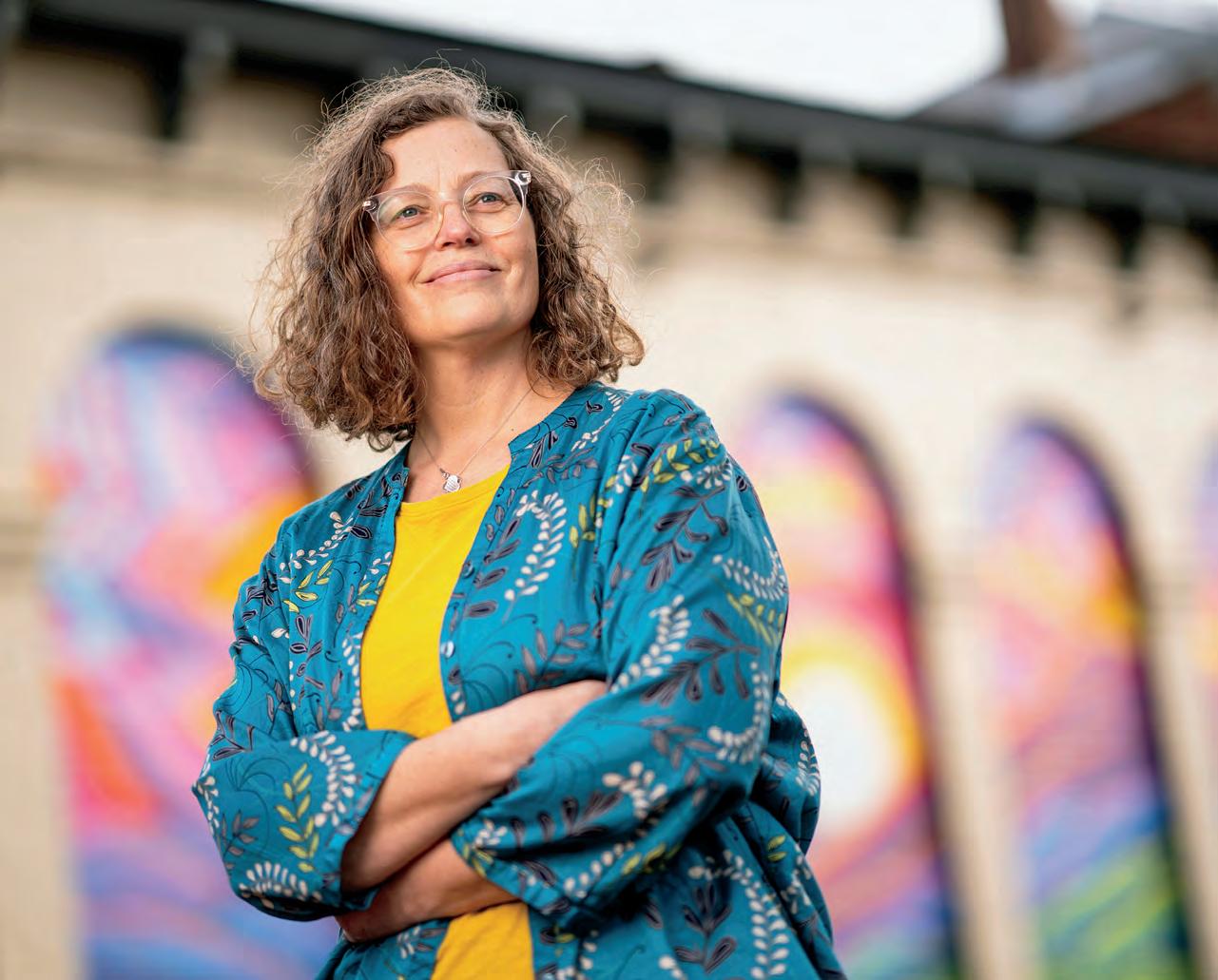
things I didn’t know I was able to do,” she explained. “It brought all of these new skills into my life, and it kept me focused, encouraged, and engaged.”
UMGC’s online curriculum allowed her to pursue her studies even when she needed to move, she said, and the help she received from support staff and instructors helped keep her on track.
Two counselors in particular, Wayne Holmes and Janet Thomas, were essential to her success, Engelhardt said.
“At stressful times in my life, especially after the death of my father, Janet took the initiative to encourage me and showed me how the program was flexible [enough] to meet my needs. She helped me make this doable in my life.”
Bernadine Barr, who teaches sociology and psychology at UMGC, “took so much of her time and cares about students actually learning, not just passing,” Engelhardt said. And Katherine Im, the chair of the Gerontology and Social Sciences program, was always available with help and in finding mentors that could guide Engelhardt on her learning journey.
Because of the financial freedom that the Pillars of Strength scholarship offered, Engelhardt was able to take an internship at the Elder Justice Center in Tampa, Florida—a transformative experience that allowed her to apply what she learned in her courses to real life and prompted her to focus on raising awareness about the financial exploitation suffered by many older adults.
“It helped me knit the two things together,” Engelhardt explained. “This is what the research says, but this is the real world.”
Now Engelhardt has joined a group in Virginia comprising local law enforcement, the Office of the Attorney General, Adult Protective Services, and community partners who work together on issues of crime, victimization, and safety that affect older adults.
“Real estate allows me to pay my bills while I pursue my passion to help elderly people,” Englehardt said. She recently started Lemonaide and the affiliated nonprofit, Lemonaides, each dedicated to the well-being of older adults through empowerment, education, and advocacy. Her focus is on preventing elder financial exploitation. For more, visit lemonaide.org.
PHOTOGRAPHY BY MARK

BRANDI BRIDGETT IS A SERIAL ENTREPRENEUR AND FOUNDER of The Agency at National Harbor. Recognized as one of the top 40 under 40 professionals in Maryland, she runs one of the largest financial firms inside her brokerage, with more than 500 consultants nationwide.
But success wasn’t handed to Bridgett. She earned it despite life challenges that would have sidelined many others.
One of the most tragic came in 2012, when Bridgett received a call informing her that her husband had been killed in a hitand-run pedestrian accident.
A military wife, Bridgett had moved around the country with her husband, who was serving in the U.S. Marine Corps, deploying six times in just six-and-a-half years.
Like many military spouses, the frequent moves had disrupted her education and made it difficult to build a career. Born in the Washington, D.C., area, she first attended University of Maryland, College Park, then transferred to UMGC to complete her bachelor’s degree in criminology and business administration.
“Having UMGC as part of my life allowed me flexibility,” she said.
When her husband died, however, Bridgett had three young children and just $100 in her bank account and $1,000 in retirement savings. She was living in California, thousands of miles away from her relatives.
“It’s the scariest thing that a person can go through,” she said.
For support, Bridgett turned to the military community, her church, and her family, moving back to the Washington, D.C., area as she worked to figure out a path forward.
“I got frustrated one day and had a silent moment with God while I was driving,” she said, and recalled feeling a clear impres-
sion that she should teach finance.
She knew nothing about finance at the time and didn’t know what to make of it, but that soon changed.
“Two weeks later, I met a young woman who was a financial guru in an insurance agency,” Bridgett said. “So many lightbulbs went off. I thought, ‘This is it. This is what I am supposed to do.’”
The two quickly connected, and Bridgett learned that the woman had lost her own husband 15 years earlier and had raised three kids on her own. The woman offered to serve as Bridgett’s mentor.
Eager to learn, Bridgett sought to absorb as much as she could about life insurance and related financial offerings while earning the necessary licenses and certifications. In 2017, she and her father opened a financial services firm, The Agency at National Harbor.
“He had worked in insurance and annuities, and I took his knowledge along with my knowledge and understanding of technology, and we started to build this business,” she explained.
The mission of The Agency at National Harbor is to help the community understand the present-day challenges that families face related to finance, retirement, debt elimination, business finance, and wealth management.
Bridgett understood the challenges firsthand and found that she had a passion for helping others achieve financial freedom and peace of mind.
“As a certified business leader, my job is to show every person that no matter what their current financial state is, they are able to plan for the future, start to build financial stability, and begin to build generational wealth,” she said.
She believes that the United States can be a more financially literate nation, and she wants to help empower others to achieve that for themselves and their families.
“I started with women because even though I know we have progressed, we are still underserved,” she said. “I wanted to help women feel secure and have peace of mind.”
Then she expanded her focus to men and families and finally younger people. She welcomes clients of all income levels, and she also helps corporations create supplemental retirement plans, advises executives on how to leverage premium financing for their retirement, and assists individuals in customizing key components of their financial portfolios.
“It’s a one-stop-shop for all things financial,” Bridgett said. “I was that person with $100 and $1,000 in retirement who didn’t understand taxes. I will never turn someone away and say they
can’t come to my agency. We all start somewhere.”
Her vision is one that seems to resonate, and already she has had to move from her 3,500-square-foot office suite into a new space almost three times as large.
“I want to double in size in the next 12 months, and I want to take my concept and replicate it across the country,” said Bridgett.
Looking back, she admits that even she finds it hard to believe what she has accomplished in the past five years.
“I know to whom much is given, much is required,” she said. “Every time we get a new blessing, it is not just for me. It is for everyone else, too. I don’t take it lightly and I don’t take it for granted. I am just walking in what is given to me.”
WILLIAM DUNN WAS BUSY GETTING READY FOR ONE OF HIS foundation’s biggest events when he received an unexpected call. He was so caught up in the logistics of the Dunn Foundation Annual Free Turkey Giveaway, providing Thanksgiving turkeys to families in need, that he didn’t realize until later what the caller had told him.
Dunn, an entrepreneur, nonprofit leader, educator, and UMGC alumnus had been chosen to receive the prestigious President’s Lifetime Achievement Award for his volunteer service.
At a January 20, 2024, award ceremony at Zion Baptist Church in Washington, D.C., Dunn received a medal and certificate signed by President Joe Biden honoring his foundation’s work.
“Our mission is to help families become better for themselves by providing them with something they need,” Dunn said.
Dunn’s commitment to the community is rooted in his own experience as a troubled youth. As a child, he alternated between living with his father in New York City and with his mother, a civil rights activist, in Virginia. As a teen, organized sports helped rescue him from gang activity, and he became a Golden Gloves boxing champion while also excelling in basketball, football, and track.
A basketball scholarship opened the door for Dunn to attend Virginia’s Longwood University. After graduating, he joined the military and played on the All-Army Basketball team, hoping it might lead to a career in professional sports. But deployments to Iraq in 2002 and 2003 put that aspiration on the back burner— and changed the way he viewed the world.
“I said that if I made it [home], I would give back to my community,” Dunn recalled. “I wanted to change the world through giving.”
Dunn returned to civilian life and was running a basketball camp and working at community centers in lower-income neigh-
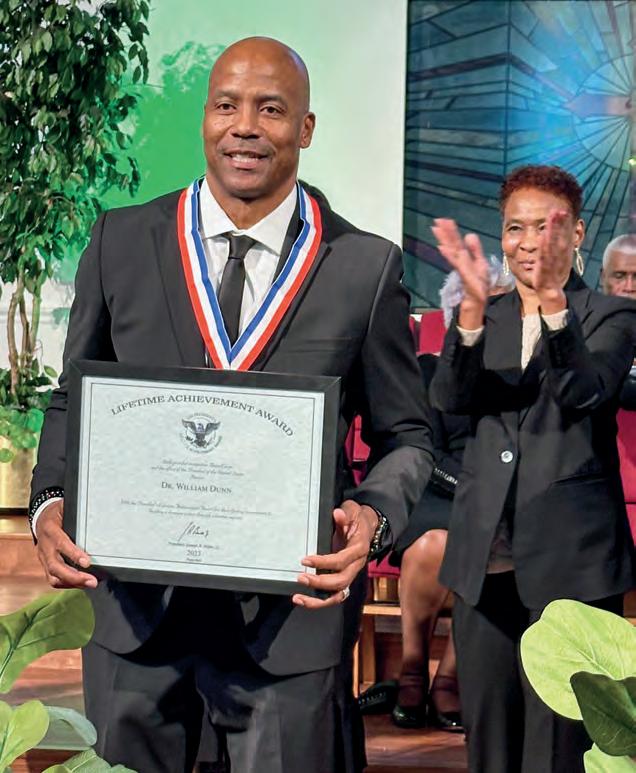
borhoods in Washington, D.C., when the military notified him that he had limited time to use his GI Bill education benefits
When he saw a UMGC advertisement on the subway system, he recognized an opportunity.
“I applied to a graduate certificate program,” Dunn said. “It wasn’t my goal to get a master’s degree. I was just going to get a 12-credit certificate.”
Dunn came late on the first day of an in-person leadership course designed for MBA students.
“Everyone in the course wanted to be a CEO or human resources manager,” Dunn recalled. “I just wanted to do the bare minimum.”
He continued to come to class late until one day, his professor asked him to stay after class.
“She said, ‘Have you thought about getting your master’s degree? You know, you’re pretty smart,’” Dunn recalled. “As a
troubled youth, I never had an educator in my entire school life tell me that I was smart. It was a turnaround moment.”
Dunn transitioned to the degree program and, in 2006, graduated with his MS in Organizational Management and a concentration in nonprofit management. Three years later, he launched a commercial cleaning company—Iamdunn Cleaning Solutions, LLC—that now counts multiple bank branches, schools, businesses, churches, and movie theaters among its lengthy list of clients.
He channeled his competitive streak into community service and education, and in 2019, Dunn and his wife both earned doctoral degrees from Capella University.
“Degrees don’t have to be for everyone, but learning is,” he said. “I wanted to chase learning.” In addition to managing the family foundation and running his company, Dunn teaches English and math—interwoven with a big dose of leadership training— as an adjunct professor in the Montgomery College Workforce Development and Continued Education Department.
He was a subject of the Washington Post’s book and documentary film, Being a Black Man: At the Corner of Progress and Peril.
Currently, the Dunn Foundation each year provides holiday meals to more than 700 families in the Washington, D.C., metropolitan area, distributes some 1,100 free backpacks and school supplies to children in need, and partners with D.C.-based SOME (So Others Might Eat) to provide winter clothing and food to homeless individuals and families.
“Sometimes we need to show our peers that we can do good in the community,” he said. “If we all just do a little, we can help a lot.”
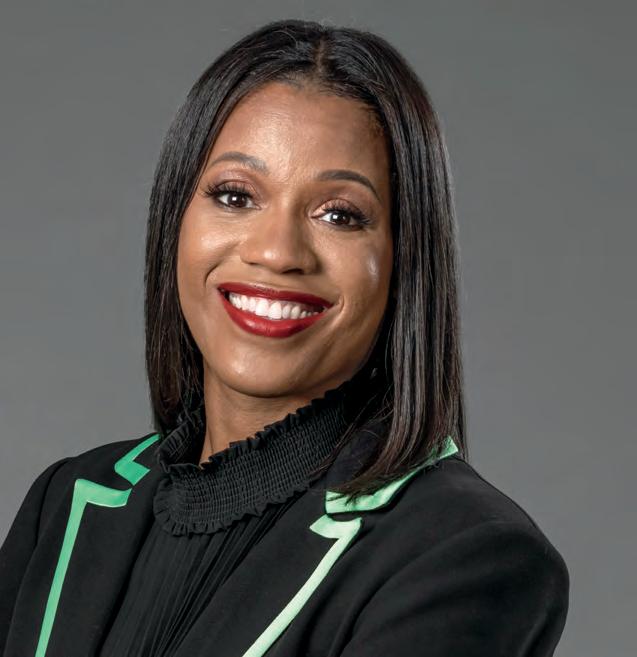
GROWING UP IN KENTUCKY, LISA WRIGHT ’11 DREAMED OF A career in journalism. As an undergraduate, she studied journalism and sociology and landed a coveted position at an ABC affiliate in Lexington.
“Starting out, this is what I wanted to be. I wanted to tell these amazing stories,” she said.
For years she worked as a producer, writer, and on-camera reporter for ABC and NBC affiliates. As she gained experience, however, she found herself growing weary of the grueling schedule and realized that the work wasn’t quite what she had imagined.
“When you work in TV, it is a lot more headline-based,” she explained.
She reached a tipping point when her station sent her out during a tornado warning to cover the story.
“I remember being outside, thinking, ‘This is not what I thought it would be,’” she said.
She realized she was looking for greater fulfillment in her work. Inspired, she dove into a new career in the nonprofit world, accepting a position with Big Brothers Big Sisters, where she focused on public relations, marketing, fundraising, and building the organization’s brand.
“It was the most rewarding experience [to see] kids matched with mentors and how it impacted their lives,” Wright says. “I met a lot of wonderful people.”
One contact led to her next role at The National Marrow Donor Program in California. Although the work was similar, her objective was to help parents of sick children find life-saving bone marrow donors. When it was successful, it was a thrill, while failures were heart-wrenching.
“It’s one of those things where you see the goodness in people come out,” she said, recalling how thousands of people showed up to see if they were a bone-marrow match for a sick four-year-old.
After transitioning to a leadership role with The National Marrow Donor Program in Richmond, Wright worked closely with the insurance industry, which led to the next step in her career, first working with health insurer Anthem before accepting a position with UnitedHealth Group in Maryland.
She thrived at UnitedHealth. Her writing and speaking skills from her journalism days were an asset, as was her knowledge of healthcare from her years working in the nonprofit sector. Her colleagues took notice, and during her 11 years at UnitedHealth, she twice won the prestigious Living the Mission award.
“This changed the trajectory of my career to leadership, and I wanted to go back to school,” she says.
As she transitioned into leadership roles, she wanted to return to school but was concerned that she couldn’t fit an MBA program into her busy schedule. When she met someone who attended UMGC, the pieces fell into place.
“I still keep in touch with my cohort, this group of working professionals with amazing day jobs,” she said. “We had this level of camaraderie and friendship, and for me this was life-changing.”
Just weeks after earning her MBA, she was chosen for a highly competitive leadership immersion program at UnitedHealth Group—one for which she wouldn’t have qualified without a master’s degree. At the end of the program, she moved to Pennsylvania to become president of the Medicare division in that state. After several years in that role, she moved with her family to Texas, where in 2020 she accepted her current role as president and CEO of Community Health Choice (CHC), a managed-care organization with 700 employees.
COVID-19 was taking hold and employees were transitioning to remote work, and Wright embraced the challenge.
CHC’s mission is to improve the health and well-being of underserved Texans by opening doors to healthcare and healthrelated social services, offering a wide range of affordable and no-cost health insurance plans bolstered by one of the largest provider networks in the area. In addition, they help with education, employment, housing, food, and other necessities.
“It’s so great to be part of an organization that does so much more than prevention and wellness,” said Wright. “We are literally taking care of the whole person and family. It’s very rewarding, and we do a lot of good work.”
Looking back on a career with its share of twists and turns, Wright is grateful for each of them.
“You can’t be afraid to try something new,” she insisted. “I’m a firm believer that the worst thing you can do is not try. Sometimes we have to learn what to do, and sometimes we have to learn what not to do. The only thing that helps us with that is experience.”
A U.S. NAVY VETERAN WITH MORE THAN 30 YEARS OF EXPERIENCE in engineering, IT, cybersecurity, and project management, Ahmed R. Ali, president and founder of TISTA Science and Technology Corp., of Rockville, Maryland, established the company in 2005.
TISTA, which qualifies as a service-disabled veteran-owned business, ranks as the second-largest veteran-owned business in the Greater Washington, D.C., area, focusing on the cybersecurity and health IT sectors within the federal, state, and local

governments, as well as in the commercial sector. Currently, the company has more than 1,300 associates worldwide and boasts more than 20 government clients.
Through its social responsibility arm, TISTA Cares, the company seeks to make a positive impact in underserved communities by supporting self-sustaining solutions, focused on supporting underserved healthcare delivery and mental illness treatment, ending homelessness, enabling equal access to educational excellence, and providing access to services for victims of human trafficking.
Said Ali, “We feel that with our current strategies, partners, and employees, we are at the forefront of greater things, and we welcome the challenges that await.”
In 2020, Ali was honored with the UMGC Alumni Executive Business Leader award, which honors individuals who serve in leadership roles in their communities and promote involvement with the university. In addition to being a role model for leaders, Ali has supported students and alumni with career opportunities by sponsoring UMGC’s 2020 Spring Virtual Career Fair and by donating generously to the Pillars of Strength Scholarship Fund, which supports the caregivers of wounded, injured, or ill military servicemembers. F
At UMGC, academic leaders are poised to restructure 21st-century learning experiences around the common currency of workforce-relevant skills. BY MARY DEMPSEY
LEGOS. CHILDREN PLAY WITH THE SNAP-TOGETHER BLOCKS. ADULTS COLLECT THEM. MUSEUMS mount exhibitions featuring miniature Lego buildings or even entire cities built of the interconnecting pieces. F Now University of Maryland Global Campus (UMGC) is using what is akin to a pedagogical version of those famous plastic bricks to carry its learning experience into the future. Flexing the muscles that have put it at the forefront of higher education innovation, UMGC will at every opportunity—from seminars to courses to certificates to degrees—begin snapping together tiny blocks of skills to build learning experiences. F “Historically, education has operated as something of a black box. Learners signed up, paid tuition and fees, and immersed themselves


in a learning experience without a clear understanding of what they could expect to receive in return,” said UMGC President Gregory Fowler. “We told students, repeatedly and convincingly, that they needed to go to college—and even that their long-term success was contingent on earning a degree. But we were not always as conscientious in ensuring that the courses and programs we offered were what students actually needed—or even that our learning experiences were structured to deliver the knowledge, skills, abilities, and dispositions that are the common currency of today’s workforce.”
To counter that deficit, UMGC has embraced a new and nimble shift in course design. This new approach lets the university lasertarget the skills students acquire while also providing measurable assurance to employers that UMGC graduates are workforce ready.
“It is a deliberate approach to designing with the end result in mind, and that end result is successful performance in the workplace. It is the philosophy we’re applying as we develop new learning experiences,” said UMGC Senior Vice President and Chief Academic Officer Blakely Pomietto. “It is no longer subject matter experts sitting down to put in all the content they think students need to learn. It’s now about verifying and refining those assumptions through external data—employers and jobs—and building a learning experience that develops and cultivates in learners the specific knowledge, skills, abilities, and dispositions that have explicit application in a real workplace.” Pomietto said the change marks a move away from a focus on the content of individual courses toward a more granular and
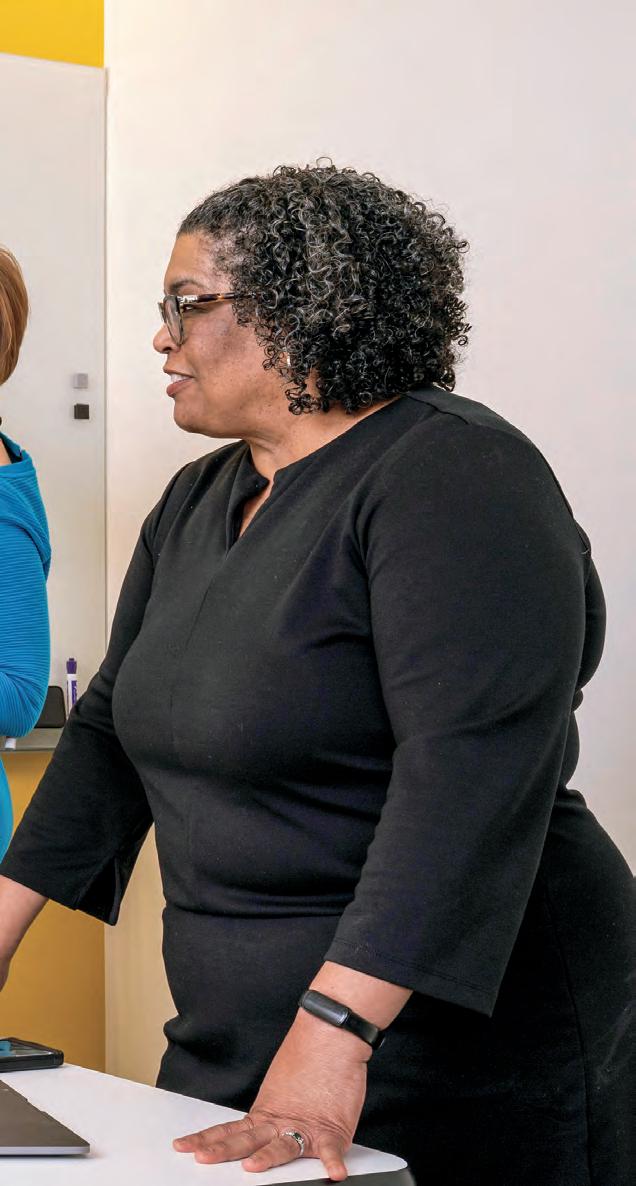
stackable curriculum whose endgame is employability.
This academic revamp incorporates more intense experiential learning, including capstone assignments and teamwork projects that replicate real workplace tasks and problem solving. It also makes certain that students understand the exact skills they are developing and how to talk about them in job interviews.
“If I, Blakely, can’t sit down in a conversation with a supervisor or hiring manager in an interview and articulate with specificity and confidence what my skills are, an employer can’t really know if I can contribute to their company. We are trying to bridge that language divide,” Pomietto said.
This redesign responds to the fast-changing pace of today’s labor market. It brings forward the deeper learning that adults
are calling for. It counterweights growing skepticism about the value of a college degree. And, as an added benefit, the breakdown of learning into smaller modules may also cut the time— and cost—for students to achieve the credentials they need.
Pomietto noted that when students no longer have to take or retake entire courses to gain one specific component of knowledge, they can move faster along their educational path. At the same time, the use of information modules for verifying skills could make it easier to transfer course credit because what has been learned can be more easily verified.
The first learners to benefit most deeply from the education redesign will be the 2,700 expected to enroll in the university’s MBA program this fall. By 2026, the whole university will be aligned with the new course design.
“I’m really excited. I think it will serve our students well,” said Pam Carter, portfolio vice president and dean of UMGC’s School of Business. “We started with the MBA to make it more focused on specific skills. It’s not just what skills should be generally embedded in the program or what we have already presented in the program, but it is more in deciding that learning those things is not enough. Students also have to understand what skills they are acquiring and be able to articulate that.”
Carter said three overarching themes in business are being elevated: sustainability, entrepreneurial thinking, and innovation. No longer do students take specific courses on those topics but, rather, “those themes will be woven throughout their learning,” Carter explained. “And we incorporate those themes in a way that is transparent.”

“ It is a deliberate approach to designing with the end result in mind, and that end result is successful performance in the workplace. It is the philosophy we’re applying as we develop new learning experiences,” said UMGC Senior Vice President and Chief Academic Officer Blakely Pomietto.

“ Carter said that the School of Business is breaking the learning experience into small bricks of information that can be laid side-by-side, or atop one another, to develop exactly the skills students need for the jobs to which they aspire. These bricks can be dismantled and reassembled in real time whenever the needs of employers and students change.
Carter said that the School of Business is breaking the learning experience into small bricks of information that can be laid side-by-side, or atop one another, to develop exactly the skills students need for the jobs to which they aspire. These bricks can be dismantled and reassembled in real time whenever the needs of employers and students change.
“This is future thinking,” Carter said. “We can be agile even as a huge university. We can combine different skills. If we know, for example, that this skill now requires new technology . . . we can add in that technology.”
The first phase of the redesigned MBA rolled out in fall 2023. This coming fall, the program adds a significant change, pivoting from a generalist MBA in which students all take the same classes to a more customized program that allows students to specialize in specific areas, if they so choose.
Although part of the redesign is taking place behind the scenes, Carter said some changes are already obvious to students. For example, an introductory course—originally designed to put all students on a level playing field, regardless of whether they came from a business background—has been retired.
“We found that some students needed it but others did not— and those who did not were not appreciative of having to go through the material again,” Carter explained. “So instead of one course that everyone has to take, students in all our basic core courses can take an assessment that helps us see what prerequisite knowledge they may be weak on. What they will get back is a personalized blueprint that says, ‘We’ve assessed that you might need to have additional assistance in one or two areas.’”
For students who fall short on a prerequisite or have been out of school long enough to need a refresher, the personalized blueprint guides them to supplemental materials they can tackle at their own pace, with a faculty member assigned to each set of supplemental materials who serves as an additional resource for students. One consequence of this streamlined approach is that
the MBA now requires only 30 credits of study, rather than the previous 36. And within those 30 credits, students can take electives, an option that wasn’t previously available.
The MBA program offered a good launching point for the revised learning model because it already carried a strong experiential learning component, a pillar of the new academic framework.
“We will have project-based assignments that are more contextualized to solve problems. What should you be doing next? What kind of data do you need to analyze?” Carter said. “We will also have, as part of the capstone, a simulation setting where students bring together everything they have learned. They make decisions, the simulation runs, and they can see the results. Then they go through another run.”
The dean said this active learning enables students to use their new knowledge immediately, putting them on top of what they need to be successful in their current jobs. It also gives them a good foundation to pursue other career avenues.
“Student success is our focus,” Carter said.
The MBA may be the launching point, but noncredit programs and other professional development offerings are also being shaped by the new approach to learning.
“We’re getting ready to develop a whole range of noncredit programming alongside our for-credit programs,” Carter said. “There may be potential students who want to get ahead in their careers, but that doesn’t always mean getting a degree or even a certificate. It may be that they just need a snippet of information.”
By way of example, she pointed to the Capital Region Minority Supplier Development Council (CRMSDC), which had grant money to help CEOs of small and midsized businesses weather the COVID-19 pandemic. CRMSDC came to the university, which developed a six-week noncredit program offering the very specific expertise those CEOs needed.
This new vision for learning has been percolating behind the scenes at UMGC for several years, but it ramped up when MJ Bishop, vice president of Integrative Learning Design, joined the university in 2022. She is nationally known for her scholarly work at the forefront of learning environment design and evaluation and—after nearly a decade as director of the University System of Maryland’s William E. Kirwan Center for Academic Innovation—she had a long history of collaboration with UMGC.
Key to her current role is the creation of a university-wide culture of collaboration.
Although changes are well underway, Bishop described the full process as “an evolution over time, a gradual evolution with incremental change along the way.”
Traditionally, decisions about curriculum are left to the
THE NEEDS OF A FAST-CHANGING WORKFORCE underpin the revamped learning experience at University of Maryland Global Campus (UMGC). They also underscore a thorny question.
In a world where new jobs and corresponding skill sets emerge each year, how does one predict the labor market of the future?
Many institutions of higher education argue that people who are equipped with certain technical, communication, and critical-thinking skills can adapt to any job. But as employers clamor for more specific skill sets, UMGC has taken a different position, engaging a variety of sources to reenvision what students need to know.
The results have played a powerful role in the jobsfocused redesign of the MBA program, which this fall unveils a skills-forward curriculum. A similar shift in the learning experience will roll out across the university in the next two years, ensuring a closer match to the skills that employers are seeking.
“When we went about redesigning the MBA, we talked to adjunct faculty teaching in the school. They are a huge source of industry insider information,” said Pam Carter, portfolio vice president and dean of UMGC’s School of Business. “We also looked at workforce data, including what’s showing up in job ads, what’s showing up in industry publications, to determine the skills that are sought.”
Many adjunct faculty members are active practitioners in their fields, and others have deep connections with industry leaders.
UMGC’s Career Services advisers are another internal source of labor market projections. They rely on input from their industry and government sources, including employers who regularly hire UMGC graduates, and discussions are underway about expanding Career Services’ involvement in courses.
The School of Business is also broadening the job of its advisory boards, especially in the District of Columbia, Virginia, and Maryland, to obtain more industry insight, Carter said.
Chris Motz, UMGC’s chief partnerships officer, is spearheading outreach to corporations to ensure that learning experiences align with their needs and expectations.
“Chris Motz is always out in the community talking to our partners, trying to understand what is shifting and what is changing,” said UMGC Senior Vice President and Chief Academic Officer Blakely Pomietto. “Our teams across the institution are tracking and assessing what is
going on so that we have our finger on the pulse of labor market needs.”
Additionally, Pomietto said, state and federal Bureau of Labor Statistics reports “help us gather input that tells us the reality of what the employment landscape is like.”
Key terms in job descriptions on employment boards also factor into the analysis.
“Through some of the tools we are accessing, we know more dynamically how things are changing. And we can compare our skills inventory to see what gaps we need to fill, including more subtle changes . . . that we might otherwise have overlooked,” said MJ Bishop, UMGC’s vice president of Integrative Learning Design.
There is also accountability. UMGC President Gregory Fowler often reiterates that the university must work relentlessly to ensure that students get what they came for, and a partnership with Guild, a leading education and upskilling platform, enables UMGC to assess the job performance and job retention of its graduates. Using Guild’s technology platform, some of the United States’ largest employers—including Walmart, Chipotle, Discover, Hilton, Macy’s, Target, and the Walt Disney Company—can offer their employees strategic education and upskilling, with Guild tracking the results .
“
Chris Motz is always out in the community talking to our partners, trying to understand what is shifting and what is changing,” said UMGC Senior Vice President and Chief Academic Officer Blakely Pomietto. “Our teams across the institution are tracking and assessing what is going on so that we have our finger on the pulse of labor market needs.”


“ Artificial intelligence (AI) will play a role in translating the terminology across the university. It will also be used to simulate workplace learning experiences, including interactive and virtual reality learning.
academic departments, schools, and faculty. While those entities are involved in the current shift, the new learning experiences also integrate input from the university’s financial leadership, instructional design experts, career advisors, success coaches, technology experts, tutoring services, and elsewhere.
“There’s a huge organizational change with shared accountability and shared commitment,” Pomietto explained. “We are thinking from the beginning about what kinds of specialized academic support services will be essential. We are looking at the long-term financial model for every program. We’re asking ourselves if there are any partnerships we want to establish or to leverage. We have brought the entire leadership team into this work. We are seeing how every area of the university is committing to deliver success.”
Bishop said the push forward will also be shaped by an unrelenting commitment to research, data analytics, and emerging technologies that will keep UMGC at the forefront of learning improvement.
To close the gap between what employers say is important to know and what educators are teaching, UMGC must be able to document that its students have the abilities they need for tomorrow’s jobs. For some years, the university has been piloting the use of Comprehensive Learner Records—a transcript of a student’s skills—in some programs. That document, which can be shared with potential employers, offers explicit information on how the skills were acquired. The Comprehensive Learner Records now are being made available university-wide. At the same time, classes will be marked with skill icons so students can visually gauge whether they are acquiring the expertise they want and need.
Bishop said that digital badges—another means of verifying specific expertise or achievements—may also become part of the new learning model. Meanwhile, in the not-too-distant future, students may even have a mobile app that allows
them to upload their transcript and résumé, punch in their career goal, and get feedback on where they still have learning gaps—and the courses that could bridge the voids.
“A lot of things are happening at the moment,” Bishop said. How do these Lego-like blocks of learning work? Bishop explained using the example of PivotTables in Excel. Project management students need to know how to use PivotTables to calculate and analyze data. So might cybersecurity students, or even nursing students. So, PivotTables expertise will be a brick that is plugged into the learning experiences of all three programs. The learning experiences will be customized for each career field involved.
Bishop said an important part of the transition is labeling the bricks consistently. One degree program may incorporate critical thinking while another, focused on the same outcome, may call it critical reasoning or objective analysis. An employer may refer to the same skill as conceptual thinking. Artificial intelligence (AI) will play a role in translating the terminology across the university. It will also be used to simulate workplace learning experiences, including interactive and virtual reality learning.
Barry Sugarman is vice president of learning platforms at AccelerEd, a for-profit education technology company that was spun off from the university’s technology team and now provides services to both UMGC and outside institutions. As a strategic partner with UMGC, AccelerEd’s role is to identify learning management technology that will be needed to

“ UMGC is now shaking up that best practice, and Sugarman said that no one is better suited to that task.
“This university is not afraid to take chances. It has become the DNA of who we are. And that is important as we talk about movement toward the future,” he said.
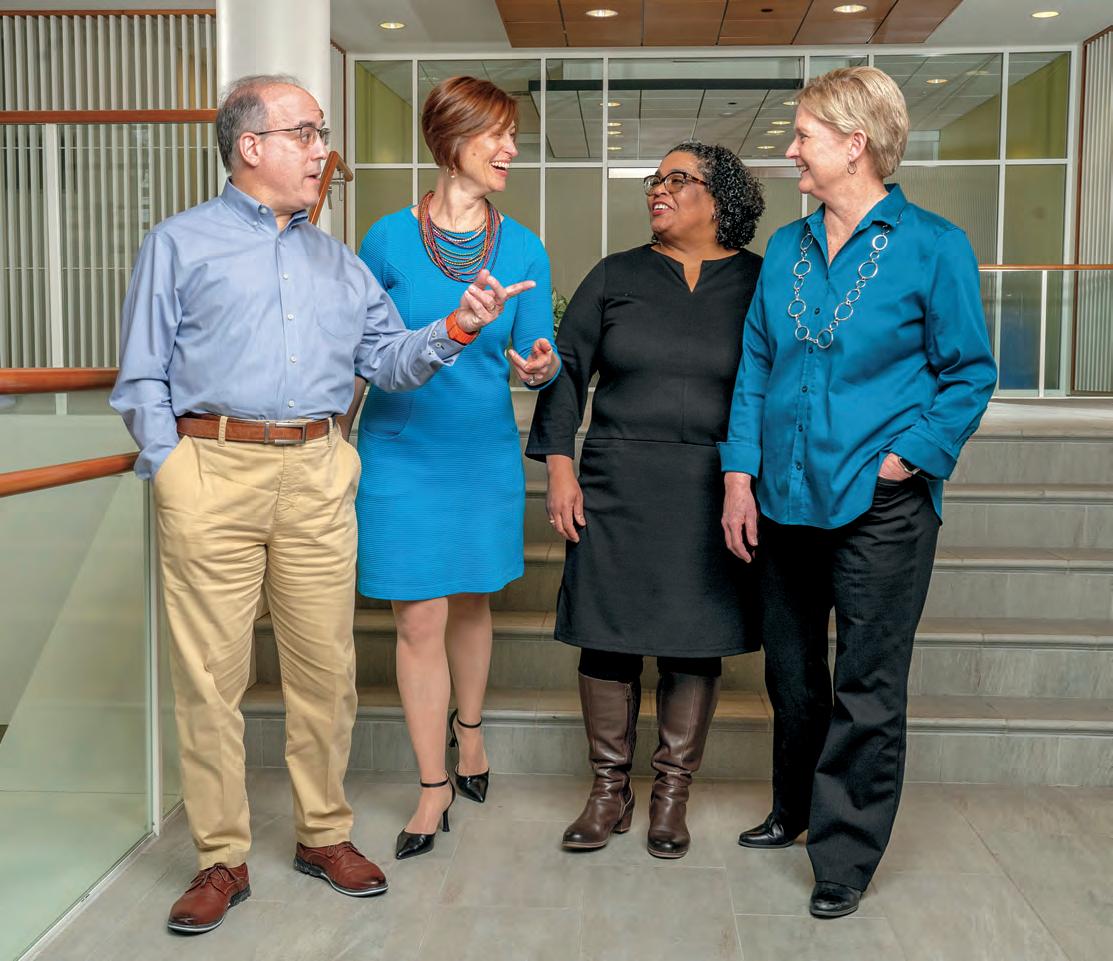
execute the new learning goals—and make it all work seamlessly at an online university with asynchronous classes and students around the globe.
“Our learning management system was designed at a time before we talked much about skills,” Sugarman said. “We talked about the holistic design of a course, about learning outcomes, about what resources students would have. And we designed courses from the beginning to the end. For the past 15 years, that has been the industry standard.”
UMGC is now shaking up that best practice, and Sugarman said that no one is better suited to that task. “This university is not afraid to take chances. It has become the DNA of who we are. And that is important as we talk about movement toward the future,” he said.
Sugarman pointed to AI as one of the most striking examples of shifting employer needs. Since late 2022, when the OpenAI startup unveiled ChatGPT, investors and venture capitalists have poured billions of dollars into the technology sector, and the impact on the labor market has been immense.
“We’re constantly looking at what is happening in the workplace and what we need to do,” Sugarman said. “A curriculum needs to stay up with the skills that an employer is seeking.”
Since it was founded in 1947, UMGC has been focused on its students’ employability, including the transition of military students to the civilian workforce. AccelerEd is now involved in determining how best to leverage enterprise software to make certain that UMGC remains a future-thinking entity.
“It is very difficult to take a traditional higher education institution and scale up the work the way we are at UMGC. We will become the go-to place for employers who want welltrained students,” Sugarman said.
At a time of rising U.S. student loan debt, he also believes that universities have an imperative to offer students “good employability outcomes so they can pay back their student loans.” Even students using military benefits to advance their academic credentials are incurring financial responsibilities, he noted. The revamped learning design could support this goal.
Pomietto and Bishop said all universities should be rethinking the way their students learn.
“But I don’t think they are,” Pomietto added. “When you look at the thousands of institutions of higher education, UMGC is at the forefront. And that’s largely because of our mission and our deeply entrenched commitment to knowing and meeting the needs of our specific students.” F
Innovative partnerships augment UMGC’s ability to reach, serve, and support new learner populations, opening new learning pathways and opportunities nationwide.
BY THOMAS MORIARTYEXPANDING AND DIVERSIFYING UNIVERSITY OF MARYLAND GLOBAL CAMPUS’S (UMGC’s) population of learners is one of five priorities at the heart of the university’s new strategic plan. Strategic partnerships will be key to achieving this goal, as UMGC President Gregory Fowler explained to participants at a recent leadership summit.
Serving these populations sometimes requires that we be willing to “go back to the basics and ensure that we have a clear sense of our mission, to understand what we do well and what must improve,” Fowler said. “In some cases, it means [pursuing] innovative partnerships with organizations or institutions that can augment what we can do— and what we can do at scale.”
The university’s partnerships with Guild and Coursera offer two key examples. Guild is a leading education and upskilling platform that connects employees of some of the nation’s largest companies with universities across the United States.
“ Serving these populations sometimes requires that we be willing to “go back to the basics and ensure that we have a clear sense of our mission, to understand what we do well and what must improve,” Fowler said.
Coursera, in turn, is a global provider of online courses, and UMGC now grants credit for prior learning experiences both on the job and from noncredit online instruction.
“Both of these organizations, given their large presence and scale in the space, have come to UMGC because they know this is something we can do at a very large scale—evaluate training opportunities for credit,” said Chris Motz, the university’s chief partnerships officer.
Through the institution’s alliance with Guild—which allows employers to invest in their employees through education, career development, and coaching—participating employers are matched with UMGC programs based on a variety of factors, including an employer’s need for a particular skill set or mode of delivery.

Within Guild, UMGC is one of a select group of learning partners chosen based on their capacity to evaluate prior learning. These universities, in turn, review the workplace training and learning experiences available to employees of each employer partner to determine what credit they can award toward a degree or other desired credential.
“In most of these cases, there are multiple [internal] trainings that these companies [offer],” said Emily Ferguson, UMGC’s assistant vice president for client relationship management. The university can articulate credit for both technical training and more general coursework, such as instruction on how to open and close a restaurant. “All of that is evaluated and catalogued for credit, and then Guild shares that information back with the company.”
Through Guild, UMGC programs are now available to more than 150 employers, including Baylor Scott White Health, Bon Secours Mercy Health, Chipotle, Discover, Herschend Enterprises, OSF Healthcare, Tyson Foods, UCHealth, and more.
Learners who complete certain courses with Coursera, one of the largest content providers and enablers of its kind, also can now stack their prior learn-

ing experiences into one of eight programs, concentrated primarily in cybersecurity and information technology.
Motz said the alliance, which launched as a pilot in September 2023, grew out of conversations with Coursera about how to create opportunities for stackable learning experiences that would appeal to learners who had already completed degrees at other institutions. Since the launch, Coursera has established dedicated landing pages to market the UMGC programs to its customers.
“The exciting part about this is the opportunity to reach these populations [that] had been looking to upskill but hadn’t necessarily considered getting another degree,” he said.
Both Motz and Ferguson emphasize that UMGC’s experience articulating credit for prior learning uniquely equips the institution to open doors to new groups of learners through these kinds of partnerships.
“You would think a lot of these types of organizations are committed to building these kinds of stackable credentials or pathways, but it is really unique to actually have a mapped out pathway for these training programs,” said Ferguson. “This is an established path for these students.” F
ILLUSTRATION BY
BRIAN STAUFFER



UMGC learners face a
wide variety of challenges, from the demands of jobs and families to unscheduled military deployments, geopolitical conflicts, and natural disasters. Now,
a new, flexible model of learner support is helping more students succeed.BY GIL KLEIN
JAMEL SHORTS PUSHED THROUGH HIS UNIVERSITY OF MARYLAND Global Campus (UMGC) education while working full time, graduating last December at the age of 21 with a degree in cybersecurity. But despite his discipline and drive, he admits to sometimes feeling overwhelmed with doubts and the challenge of getting everything done on time.
When that happened, though, he knew whom to call: Rachel Payne, a UMGC success coach trained to help students stay on track and to intervene when she sees trouble developing.
“I could always reach out to her to get any sort of help with any sort of issue,” Shorts said. “She would say, ‘Reach out to me at any time.’”
While UMGC has always been sensitive to the needs of military and adult learners with career and family responsibilities, in the past two years it has restructured its approach to student support, putting greater emphasis on helping those who are struggling, no matter the reason.
UMGC students come from a variety of backgrounds and demographics, and many at first are unfamiliar with a university environment. They may have struggled in school when they were younger and think they are not “college material.” Military servicemembers may not know how classes will fit with their schedules or accommodate deployments, and those challenges are often complicated—for those stationed abroad—by geopolitical or environmental crises that can upset their lives, families, and studies.
“When I came here, one of the things I heard over and over was that, while curriculum and content matter, the reason

nontraditional students may not succeed is usually because life happens, not because they can’t figure out the content,” said UMGC President Gregory Fowler.
For nontraditional students, he added, their studies are never going to be more than their third priority, after family and work. If the university insists that students drop everything to focus on their education, they will never be successful.
Success coaches address this reality.
“A success coach is basically like a Sherpa,” Fowler said. “I can’t climb the mountain for you, but I can climb it with you, and I have enough experience climbing this mountain to be able to tell you how to get to the top.”
UMGC has always had an advising system. Prior to 2021, though, advisors would wait for students to reach out seeking help, and whichever advisor was free would take the call. Students often complained that, if they called more than once, they would have to explain the situation over again to a different advisor, and they might even get conflicting advice.
Perhaps they had been assigned to the wrong class, or they weren’t engaged in their classroom. They might not understand
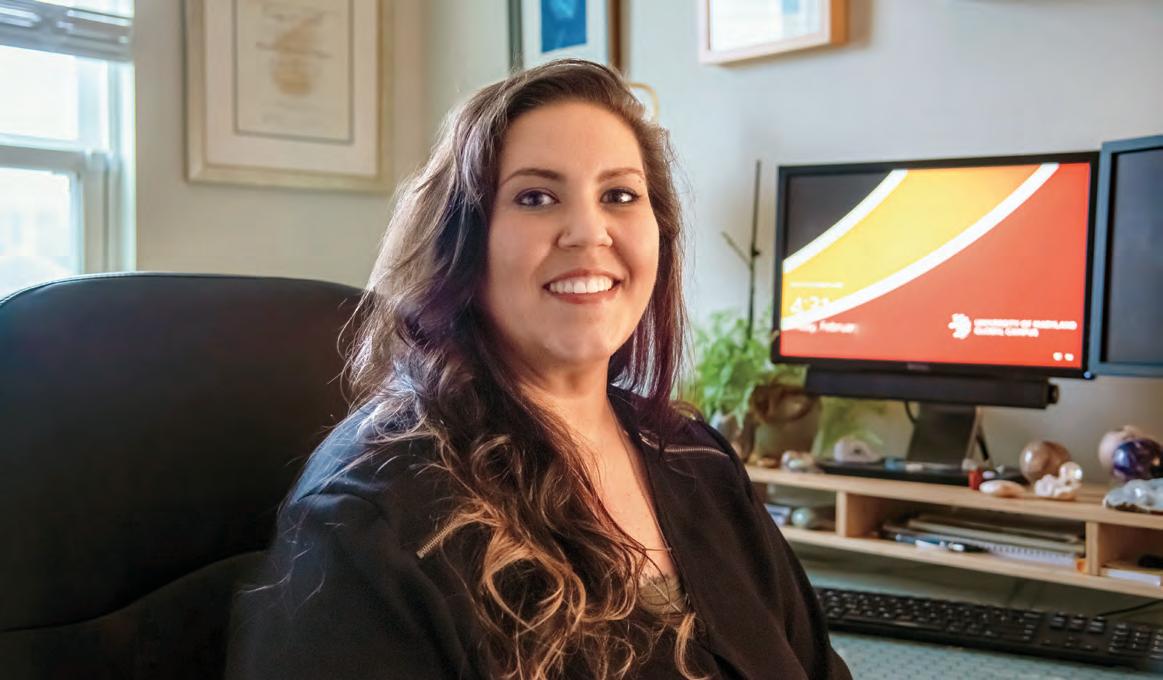
how to continue their classes when deployed or what to do when confronted with problems at work or at home. Some— feeling embarrassed or overwhelmed—might not reach out for help at all. Too often, students would drop out before they could be helped.
The new success coaching model changed that, said Senior Vice President and Chief Student Affairs Officer Martina Hansen. It assigns a cohort of students to a specific coach who then develops individual relationships with each student, striving to understand their goals, their personal challenges, and the path that they have chosen. Success coaches make sure that each student understands that someone is there to be their biggest cheerleader and advocate, focused on helping them navigate the university
“I use the word surgical, making sure the coaches know exactly what a student wants to do,” Hansen said. “What does that path look like? What courses need to be updated every term so that a student can get to graduation as quickly and successfully as possible? That is important, because the longer it takes
someone to finish, the less likely they are to complete.”
At the same time, UMGC created first-term classes to teach incoming students what it takes to succeed in college, to help them explore career goals, and to make sure they know how to access university services.
“It was important that the faculty created a safe space where students could learn what it took to be a student here,” Hansen said. “You have to give them the space to fail a little bit and then be coached back on the right track.”
Beyond the first term class, faculty members are also being trained to keep close watch on their students’ performance, she said. If students have not logged into class or are not engaging in the classroom, faculty members are prompted to send them an e-mail or text to find out what is wrong and what it will take to fix it.
“ A success coach is basically like a Sherpa,” Fowler said. “I can’t climb the mountain for you, but I can climb it with you, and I have enough experience climbing this mountain to be able to tell you how to get to the top.”
These initiatives are getting more students to graduation—or, as Fowler put it in his Sherpa analogy, to the top of the mountain. Taken together, they form a cornerstone of the university’s mission—to inspire hope, empower dreams, and transform lives . . . one student at a time. F
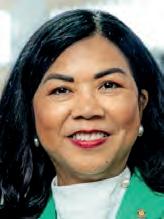
Anita Borja J. Enriquez ’87, of Mangilao, Guam, was appointed president of the University of Guam in August 2023 after serving for 10 years as senior vice president and provost. In a 30-year career with the university, she earlier served as the first female dean of the School of Business and Public Administration and as interim director of the Center for Continuing Education and Outreach Programs.

Daniel E. Bishop ’89, of Stafford, Virginia, joined the Aerospace Advisory Board of Vita Inclinata—a developer and producer of precision aerospace and industrial stabilization devices—in October 2022. He comes to the role with decades of experience, having entered the Senior Executive Service in 2010 and serving most recently as executive director, Air National Guard, for the National Guard Bureau at the Pentagon, in Arlington, Virginia. In addition to his BS in management from UMGC, Bishop holds an MS in national security strategy from the National War College and an MPA from Troy State University.

Venice Michelle Goodwine ’90, ’94, & ’14, of Woodbridge, Virginia, was appointed chief information officer for the Department of the Air Force, comprising the U.S. Air Force and U.S. Space Force. In that role, she leads three directorates with 10,000 civilian cyber and IT person-
nel—Enterprise Information Technology, Data and Artificial Intelligence, and Cybersecurity—and supports 20,000 cyber operations and support personnel around the globe with a $17 billion portfolio. She joined the Air Force in 1986 as a signals intelligence analyst and transitioned to the Air Force Reserve where she was commissioned as a communication and information officer in 2003. She retired from the uniformed service in 2022 and served most recently as director of Enterprise Information Technology in the Office of the Chief Information Officer for the Department of the Air Force. Goodwine was named a 2020 WashingtonExec Top 25 Cybersecurity Executive to Watch and won both the 2020 WashingtonExec Pinnacle Award for Cybersecurity Government Executive of the Year and the 2020 G2Xchange Women in Leadership Award. In addition to her BS in Computer and Information Systems from UMGC, she holds a master’s degree in technology from the University of Maryland, College Park, and an MBA from the William Carey University.
Benjamin Cleave Butler ’92 & ’96, of Severn, Maryland, joined Guidehouse —a leading global provider of consulting, digital, and managed services—as strategic technology alliance lead in November 2023. Previously, he held key leadership roles as global lead for AWS World Public Sector Cloud Innovation Programs, vice president of business development and strategic alliances at REAN Cloud, and senior systems engineer for the MITRE Corporation. He also served as a communications officer for the U.S. Air Force and holds a BS in systems engineering from the University of Virginia, an MS in business administration from Duke University, and an MS in Management Information Systems from UMGC.
Jeffrey Lynn Freeman ’92, of Savannah, Georgia, was promoted to director of operations of the Davenport House Museum by the Historic Savannah Foundation (HSF). In that role, he will work closely with the museum’s new executive director, focusing on building maintenance, maintaining museum records and collections, information technology, and communications. Over an 18-year career with HSF, he previously served as assistant director and collections manager for the museum and before that as museum assistant and collections manager. A U.S. Army veteran who specialized in satellite technology, Freeman worked in information technology for 15 years, first with Hewlett-Packard and later with Pinellas County’s Suncoast Transit Authority in Florida. He holds a BA in History from UMGC.
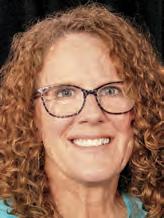
Kelli Jo Goetz ’92, of New Market, Maryland, was appointed director of Frederick County’s Family Services Division, effective July 29, 2023, after first serving as the division’s acting director and acting deputy director. The division—previously Citizens Services— includes the Child Advocacy Center, Family Partnership, and the Office for Children and Families. In a 12-year career with Frederick County, Goetz previously served as fiscal manager in the Office for Children and Families and as the division’s director of operations. She holds a BS in Psychology from UMGC, a certificate in Leading Diverse Teams and Organizations from the University of Michigan, and a graduate certificate in Sustainability Leadership from Ithaca College.
Valarie J. Burks ’97, of Holly Springs, North Carolina, joined the College of Southern Maryland as associate vice president of information management and chief information officer (CIO), bringing more than 26 years of experience in IT and operations. She served most recently as CIO for the NASA Office of Education and before that as CIO at NASA and the U.S. Department of Agriculture. She earned her bachelor’s degree from the University of Maryland, Baltimore County, and her MS in Computer Systems Management from UMGC. She also participated in American University’s Executive Leadership Program and Harvard University’s Women’s Leadership Forum.
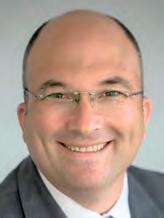
Matthew Todd Glaser ’97, of North Potomac, Maryland, was named senior director of industry engagement for the Plastics Industry Association in Washington, D.C., where he will serve as director of the association’s Processors Council. Previously, he served as senior program manager for global business development for the American Petroleum Institute and held executive positions with the National Association of Chemical Distributors and education and leadership roles with several associations based in Washington, D.C. A graduate of the University of Maryland, College Park, with a BA in government and politics, he earned his MS in Management from UMGC.
Isabella Marques de Castilla ’01, ’02, & ’03, of Washington, D.C., was named director of the new El Centro Library in El Centro, California, in December 2022. She has held multiple roles at the Library of Congress in Washington, D.C.—including as deputy director of the National Library Service for the Blind and Print Disabled—and served as senior associate dean and chief
operating officer of the Georgia Institute of Technology Library. Born in Honduras and raised in Spain, she is fluent in English, Spanish, and German, and proficient in Italian. She holds an MS in library and information science from the Catholic University of America and her BA in History from UMGC.
Ray M. Gagne ’02, of Haymarket, Virginia, joined the Institute for Defense Analyses (IDA) as a research staff member in the Strategy, Forces, and Resources Division of IDA’s Systems and Analyses Center. A veteran of the U.S. military, he previously served in the Office of the Assistant Secretary of the Army for Acquisition, Logistics, and Technology as director, Program Protection, and before that as acting deputy assistant secretary of the Army for Acquisition, Policy, and Logistics. He holds an AAS in criminal justice from the Community College of the Air Force, a BS in Information Systems Management from UMGC, an MS in computer information systems management from the University of Phoenix, and a PhD in information technology and information assurance and security from Capella University.
Jeanette H. Manning ’03, of Flower Mound, Texas, was appointed chief information officer (CIO) and executive vice president of Quorum Software, a leading provider of energy software globally. She brings more than 25 years of experience to the role, having served as CIO of companies like Forescout Technologies, Inc., DATASCAN, and Gemalto. She also supports deployed military personnel and their families via the Soldiers’ Angels program. She earned her BS in Business Management and Computer Science from UMGC.
Adam K. Thiel ’03, of Philadelphia, Pennsylvania, was appointed CEO of incoming Philadelphia mayor Cherelle Parker’s administration. Earlier, he served as Philadelphia’s Fire Commissioner dur-
ing the prior administration of Mayor Jim Kenney and from 2019 to 2022 as director of the city’s Office of Emergency Management. In those dual roles, he oversaw the city’s response to the COVID-19 pandemic and the civil unrest that followed the killing of George Floyd. Thiel holds bachelor’s degrees from UMGC and the University of North Carolina at Chapel Hill and a graduate degree from George Mason University, and is pursuing further graduate study at the University of Pennsylvania.
Benjamin Austin Stevenson ’05 & ’09, of Middletown, Maryland, was appointed director of the Montgomery County Department of Correction and Rehabilitation (DOCR) in Maryland after first serving as acting director. In more than 25 years with DOCR, he has served as division chief of community corrections, deputy chief of programs and services, and deputy chief of security and facilities, while also serving as an auditor for the American Correctional Association. He holds a BS in administration of justice from Penn State and a Master of Distance Education from UMGC, also serving as an adjunct associate professor in UMGC’s criminal justice program.
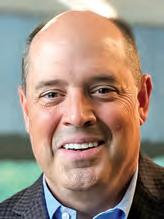
David Sweiderk ’05, of Linthicum, Maryland, in 2023 joined the board of directors of the Kennedy Krieger Institute. He is president and CEO of the SECU Credit Union and a member of the Special Olympics Maryland Board of Directors. An established leader in the financial industry, Sweiderk is a member of the MDDC Credit Union Board of Directors and also serves on the board of directors for the Kennedy Krieger Foundation. He holds a BBA in economics from the James Madison University and an MBA from UMGC.

Kim-Tuyen Thi Tran ’07, of Baltimore, Maryland, joined J3 Consulting as senior vice president of solutions delivery, bringing more than two decades of experience in enterprise IT innovation and leadership. She served most recently as senior director of IT for Edison Electric Institute and holds a Master of Engineering in cybersecurity from the George Washington University and a BS in Accounting from UMGC.

Courtney Lyn Davis ’09 & ’16, of Gaithersburg, Maryland, was named manager of the Office of Communication and Public Engagement in the City Manager’s Office, effective March 6, 2023. She brings more than 15 years of experience in communication and marketing, having served most recently as assistant director of public relations at Prince George’s Community College. She began her career as a marketing manager and publicist for national Broadway tours. She holds a BA in Communications Studies and an MS in Management, with a specialization in Public Relations, from UMGC.
Daniel Alexis Harmuth ’09 & ’11 , of Bakersfield, California, was named vice president of technology and innovation and chief information officer of Rocky Mountain University of Health Professions, effective August 14, 2023. He comes to the role with more than 30 years of IT experience in Fortune 500 companies, local government, and healthcare organizations.
David C. Henderson ’09 & ’19 , of Dugway, Utah, took over as command sergeant major for the U.S. Army Dugway Proving Ground on August 31, 2023. In that role, he serves as the senior enlisted advisor to the installation commander. He enlisted in the Army in 1997 and has held multiple roles and responsibilities since then, serving most recently as assistant commander, Maneuver Support Center of Excellence Noncommissioned Officer Academy, Fort Leonard Wood, Missouri, and command sergeant major, 2nd Battalion, 48th Infantry Regiment, Fort Leonard Wood, Missouri. He holds an AA in General Studies and a BS in Management Studies and is pursuing an MS in Transformational Leadership, all from UMGC.
Morgan Allison Hrabovsky ’09 , of Fayetteville, North Carolina, was named to the 40 Under 40 Class of 2023 by the Fayetteville Observer. A physical therapist assistant at Advanced Physical Therapy Solutions, Hrabovsky specializes in working with individuals suffering from Parkinson’s disease. When she discovered that the Fayetteville area did not offer Rock Steady Boxing—a program designed to assist those with Parkinson’s by improving symptoms such as small movement patterns, trunk rigidity, and difficulty with balance—she earned the certifications necessary to bring the program to the area. She holds a physical therapist assistant associate degree from Fayetteville Technical Community College and a BS in Psychology from UMGC.
Linda M. Turner ’09, of Huntingtown, Maryland, was appointed deputy county administrator by the Calvert County Board of County Commissioners, effective October 30, 2023. Previously, she served with the Prince George’s County Office of the County Executive as senior advisor to the deputy chief administrative
officer for Government Operations and, before that, as deputy director for Policy, Planning, and Public Affairs. She holds a BS in Business Administration from UMGC and a certificate from the John F. Kennedy School of Government Executive Education program at Harvard University.
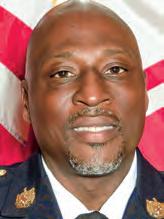
Dwayne Anthony Preston ’10, of Fort Washington, Maryland, was sworn in as the first Black chief of police for Bowie, Maryland, on January 3, 2024. A 21-year veteran of the Prince George’s County Police Department, he retired in December 2011 as deputy chief of the Bureau of Administration to join the Bowie Police Department, serving as deputy chief of police until he took over as acting chief of police in September 2023. He holds a BBA with an emphasis in accounting from Bowie State University and an MBA from UMGC.
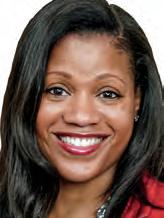
Lisa Renee Wright ’10 , of Washington, D.C., is president and CEO of Community Health Choice, a local, nonprofit managedcare organization that covers more than 480,000 members with care from almost 100 hospitals and more than 19,000 providers. Wright was named one of 2022’s Top Diversity Leaders by Modern Healthcare for expanding multi-language outreach and communications to prioritize cultural competency and developing a road map to foster a workplace culture of belonging.
Jonathan Roy Horowitz ’11, of Hagerstown, Maryland, was promoted to new business

Join our team of scholar-practitioners & help transform the lives of our students & the field of adult education.
• Competitive compensation & benefits, including health, dental, vision & life insurance
• Flexible scheduling
• Faculty development program
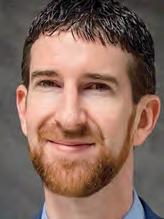
development director of Washington County, Maryland. A four-year veteran of Washington County government, he came to the role with 16 years of business experience in management, business development, brand management, executive strategy, and product development. He served as an adjunct professor at Hagerstown Community College from 2017 to 2019 and holds a degree in psychology from Frostburg State University and an MBA from UMGC. He is a member of the International Economic Development Association and the Maryland Economic Development Association.
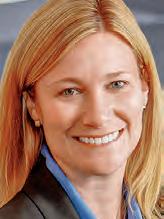
Shelley Jarrad Lombardo ’11, of Ellicott City, Maryland, was reelected vice chair of the board of directors of the Cybersecurity Association of Maryland, a statewide, 501(c)(6) nonprofit organization dedicated to the growth of the cybersecurity ecosystem. Lombardo is president of Evergreen Advisors, a leading investment bank and corporate advisory firm with locations in Columbia, Maryland, and McLean, Virginia. She holds a BA from Greensboro College in North Carolina, an MBA from UMGC, and has completed training in retail bank management from the Darden School of Business at the University of Virginia.
Brad Craig Read ’11, of Suwanee, Georgia, has been appointed vice president of finance for Hotel Equities Group, LLC, in Alpharetta, Georgia, bringing more than 20 years of experience in finance and strategy. He previously served as director
of marketing, oncology services, at the medical equipment manufacturing company Elekta. A graduate of the University of Delaware, he holds a BS in Business Administration from UMGC.
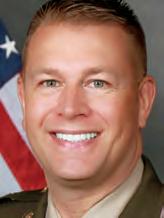
Nicholas R. Augustine ’12, of Damascus, Maryland, was appointed assistant chief of police and his appointment unanimously confirmed by the Montgomery County Council. He joined the county police in 2002 after serving as a police officer with the Maryland-National Capital Park Police. He was promoted to lieutenant in 2015 and captain in 2018, serving as director of the divisions of Policy and Planning, Personnel, and Major Crimes before being named commander of the Fourth District. A graduate of Montgomery College with an AA in criminal justice, he earned his BS in Criminal Justice from UMGC and went on to graduate from Northwestern University’s School of Police Staff & Command and the FBI National Academy. He earned an MA in criminal justice from Arizona State University and a Master of Public Safety from the University of Virginia.
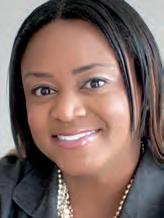
Altonia Labrai
Garrett ’12 & ’14, of Woodbridge, Virginia, was named chief operating officer of Blue Ridge Hospice in Winchester, Virginia. Previously, she served as executive director of Accent Care’s Washington, D.C., startup, and before that in a variety of roles at Capital Caring Health in Falls Church, Virginia, including in executive leadership, health equity advocacy, public affairs, and others.
She earned a BS in health sciences from James Madison University, her nursing degree from Marymount University, and an MS in Healthcare Administration and MBA from UMGC.
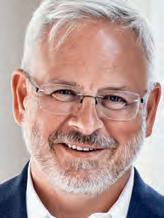
James Braswell Henderson ’12, of Bossier City, Louisiana, was named the 15th president of Louisiana Tech University after serving for seven years as president of the University of Louisiana System. Before that, he served as president of Northwestern State University and chancellor of Bossier Parish Community College, both in Louisiana, and as vice president for career and technical education for the entire Louisiana Community and Technical College System. Before moving into higher education, he served for four years as director of administration and workforce development for the Louisiana Department of Labor and for 10 years in the private sector in hotel management. A graduate of Northwestern State with degrees in journalism and English, Henderson earned his MS in Administration from the University of West Florida and Doctor of Management from UMGC.
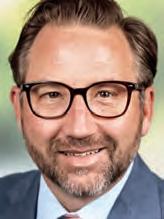
Shane W. Knisley ’12 & ’14, of West Chester, Ohio, was named president of Bon Secours Maryview Medical Center in Portsmouth, Virginia, effective March 13, 2023. He joined Bon Secours in 2018 in its Cincinnati market and served most recently as president of Mercy Health–Clermont Hospital in Batavia, Ohio. Prior to that, he was chief operating officer of Mercy Health–Fairfield Hospital in
Cincinnati. A 23-year veteran of the U.S. Navy, he served as a hospital corpsman and was commissioned as an officer with the Navy’s Medical Service Corps. A graduate of the Marine Corps Command and Staff College in Quantico, he holds a BS in Information Systems Management from UMGC and an MS in health administration from Baylor University’s Army–Baylor Program.
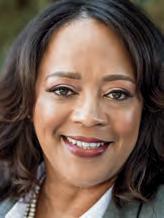
Dawn R. Medley ’12, of Laurel, Maryland, was named president and CEO of FSC First—a U.S. Treasury-designated Community Development Financial Institution based in Prince George’s County, Maryland—after first serving as senior vice president of business finance programs. She previously served as director of business lending programs in the Maryland Department of Housing and Community Development. She holds a BS in Business Administration and Public Policy from UMGC.
Ramond Jonathan Sneed ’12, of Baltimore, Maryland, was named general manager of Hotel Revival Baltimore, where he oversees all aspects of Revival’s operations and focuses on the guest experience, community partnerships, and social impact. Previously, he was general manager of the Sonesta Select Hotel in Arlington, Virginia; director of operations for the Royal Sonesta Harbor Court Hotel; and senior food and beverage manager for the Renaissance Harborplace Hotel. He earned his BS in hospitality and tourism management from the University of Maryland Eastern Shore and his MBA from UMGC.
Melissa Stefko ’12, ’16, & ’17, of Odessa, Florida, was named among the “Top 25 Healthcare Technology Leaders of
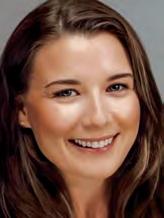
Tampa for 2022” by the Healthcare Technology Report. She is senior director of quality for the FlexPro Group, a top provider of professional services that advance the pharmaceutical and biopharmaceutical industry, and is an active member of the American Society for Quality, a Certified Quality Auditor, and a Certified GMP Professional. She serves on the regulatory committee of the Alliance for Pharmacy Compounding and the steering committee for the International Peptide Society, and as a member of the Regulatory Affairs Professional Society. She holds a BS in biology with a minor in chemistry from Florida State University—where she co-founded the Pre-Pharmacy Informational Leadership and Learning Society—and an MBA and MS in Biotechnology from UMGC.
Marc Manfredi ’13, of La Mesa, California, was promoted to sergeant in the Mercer County Sheriff’s Office. A 2015 graduate of the Mercer County Police Academy, he was assigned most recently to the Courts Unit, where he focuses on safety and security. He is a master chief petty officer in the U.S Navy Reserve and holds a BS in Cybersecurity from UMGC.
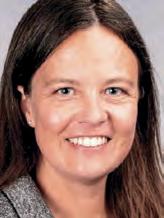
Brigette Eva Reed ’13, of Bel Air, Maryland, a Certified Professional Accountant (CPA) and Associate in Insurance Accounting and Finance (AIAF), has been promoted to director of accounting at Harford Mutual, where she will oversee accounts receivable and payable, as well as premium taxes. She joined Harford Mutual in 2015, having previously held positions as senior accounting
assistant, accounts receivable supervisor, and accounting manager. She holds a BS in Accounting from UMGC.
Valerie Dawn Hawkins ’14, of Westminster, Maryland, was promoted to Carroll County Government director of public safety. She has worked for Carroll County for more than 10 years, serving as emergency management data analyst, emergency management assistant manager, emergency management manager, and acting director of public safety. In her new role as director, she will manage all emergency management operations of Carroll County, ensuring efficient operation of the Emergency Communication Center and Emergency Operations Center in support of police, fire, and emergency services. She has more than 25 years of experience in emergency services, including as an American Red Cross Disaster Services responder and instructor and a paramedic in Carroll County. She earned her BS in emergency management from UMGC.
Suresh Subbaratinam ’14, of Ashburn, Virginia, was named chief technology officer of Avint LLC, a federal cybersecurity and management consulting firm in Herndon, Virginia. Subbaratinam has a patent pending on cybersecurity vulnerability and risk prediction using machine learning and deep learning algorithms and at Avint will lead solution architecture, shape technical innovations, and oversee quality initiatives. He previously served as enterprise solutions architect at CACI International and as a cybersecurity solutions architect for ManTech. An adjunct professor in cybersecurity at Marymount University, he holds a BS in electrical and electronics engineering from Alagappa Chettiar College of Engineering and Technology, an MS in Cybersecurity from UMGC, and a DSc in cybersecurity from Marymount University.
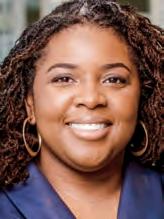
Ashleigh L. Aldridge ’15, of Severn, Maryland, was named director of media and communications and public information officer at Shelton State Community College, where she will manage all areas of the college’s communications and marketing efforts. She previously served as communications director in the Office of the Vice President for Diversity, Equity, and Inclusion at the University of Alabama at Birmingham. She holds a bachelor’s degree in communications from Alabama State University and an MS in Management with a specialization in Public Relations from UMGC.
Vaughn Scott Peterson ’15, of West Jordan, Utah, was named vice president of information systems at Coast Central Credit Union, where he will be responsible for technology areas, leading a team of 11 in ensuring network security and compliance, increasing efficiencies and enhancing operations, and monitoring trends. He comes to the role with more than 20 years of IT experience, most recently serving as chief technology officer of Cyprus Credit Union in West Jordan, Utah, and before that as IT manager of Greater Nevada Credit Union. In addition to various certifications, he holds a BS in Cybersecurity from UMGC.
Kathleen Siedor ’17, of Mount Airy, Maryland, was named executive director of the Frederick Children’s Chorus, an all-inclusive children’s chorus founded in 1985 on the premise that any child, regardless of training or financial standing, should be able to become the best singer they can be. Siedor joined the organization in 2019 as office manager and was recently honored with the Touching Lives in Frederick County Award. In addition to her BS in Business Management from UMGC, she holds an AA in general studies from Frederick Community College.
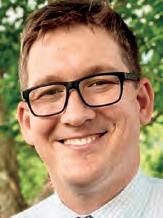
Christopher James Bolster ’18, of Sykesville, Maryland, has been promoted to vice president of finance at Booz Allen Hamilton after serving as director of finance and operations for more than a year. He joined Booz Allen in 2007 as a senior associate, providing account leadership and guidance on management, audit and compliance, revenue, and profitability. He holds a BS in international business from the University of Maryland, College Park, and an MBA from UMGC.
Clifford Timpson ’18 & ’20, of Hanover, Maryland, received a Science Spectrum Trailblazer Award at the 2024 BEYA STEM DTX Conference, hosted by Lockheed Martin and Google in partnership with Career Communication Group’s US Black Engineer and Information Technology magazine and the Council of Engineering Deans of the Historically Black Colleges and Universities. Trailblazer Awards are granted to individuals who demonstrate outstanding performance in science, technology, engineering, and mathematics. A veteran of the U.S. Army, Timpson holds BS degrees in Management Information Systems, Cybersecurity Policy, and Management and Information Technology and an MS in Information Technology from UMGC, where he is a member of the Cybersecurity Advisory Board.
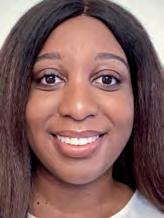
Cathy Kuangu ’19, of Silver Spring, Maryland, is the founder and executive director of the Sadi Alice Foundation (sadialicefoundation.org), a nonprofit organization based in Tshikapa,
Democratic Republic of Congo, and committed to supporting women’s health, community building, and professional development. She previously served as a principal success manager for Salesforce and a technology consultant for Deloitte. She earned her BA in international relations from the College of William and Mary and an MS in Management–Project Management from UMGC.
Daniel Lewis ’22 , of Lorton, Virginia, was named chief financial officer of Frederick County following a national search. He has worked in Frederick County government for some 22 years, beginning as a high school intern and since serving as manager of the Treasury Department. He is a Certified Public Finance Officer, a member of the Government Finance Officers Association, and co-chair of the Tax Affinity and Munis User Group of the Maryland Finance Officers Association. He earned his BS in management from UMGC and an AS in business management from Frederick Community College.

Shavonte LewisCisco ’22, of Cambridge, Maryland, was named community impact and engagement manager for the Eastern Shore Area Health Education Center. She has more than 15 years of experience in public service, having previously served as a workforce development specialist for the Maryland Department of Labor, community engagement coordinator for Moving Dorchester Forward, and family investment specialist for the Maryland Department of Social Services. She earned her BS in Psychology with a minor in Political Science from UMGC.

For more than 75 years, UMGC has helped students reach their goals. You can help, too. Support the Student Aid Fund for Emergency Relief (SAFER) and you’ll be helping UMGC students worldwide overcome financial hardships due to unforeseen emergencies. Contributions help bridge financial gaps for students in the following areas:
• Housing • Course materials • Technology • Childcare • And more

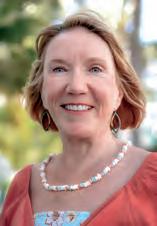
BARBARA LANE ’95 was not looking for a national audience when she wrote Broken Water. Rather, she was honoring her sisters’ request that she tell the story of how 11 siblings, abandoned and then scattered across the country, found one another after more than four decades.
Indeed, the attention from news outlets when the book came out caught Lane off guard.
People magazine carried a story about the self-published book, as did Britain’s Daily Mail newspaper. Talk show host Whitney Reynolds, whose program is carried by PBS stations, taped a segment on Lane. Broken Water was mentioned in Parade magazine and on radio stations and podcasts in multiple countries.
“The story of my sisters and me provides a unique look into the lives of a particular family, but I think the book resonates with others who survived trauma in foster care,” Lane said. “We were 11 girls, many of us ended up in the foster care system, and not one of us escaped physical or sexual abuse. The book offers a message of hope and healing.”
Lane reunited with her 10 sisters in 1997 and, in the years that followed, each slowly shared her story with
Samantha Howard ’22, of Upper Marlboro, Maryland, was appointed Latino Affairs Liaison for Prince George’s County, Maryland, effective August 14, 2023. In that role, she works to strengthen the county’s connections to its Hispanic and Latino community. Before joining Prince George’s County government, she served for more than 15 years as coordinator of recruitment and community relations at Prince
Lane. Some spoke willingly about what happened to them after they were found abandoned, hungry, and cold in an unheated apartment. Others revealed their stories to Lane in bits and pieces. It took 15 years to complete the book manuscript.
“We had a pact that if even one sister said ‘no’ to the project, the book wouldn’t be done,” Lane explained. “Each sister knew her story. But reading the book was the first time that they knew the stories of the other sisters in totality.
“Once the book was published, we all cried and dried each other’s tears.”
Lane said her UMGC education laid the foundation for a 25-year career as a ministerial counselor focused on helping people who have experienced trauma. At the time she enrolled, she was a busy mother looking to advance her education. She earned a degree focused on human development and social sciences, graduating magna cum laude.


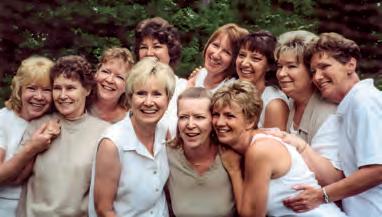
George’s Community College (PGCC). She holds an AA in speech communications and rhetoric from PGCC and a BA in Communication Studies from UMGC.
Mary Tatar ’22, of Towson, Maryland, was appointed nurse specialist by the Maryland Center for Facial Plastic Surgery in Baltimore, Maryland. She has more than 40 years of nursing experience, having served as a staff nurse at Sinai Hospital,
She followed that with a graduate degree in family psychology in Virginia, where—thanks to a connection she made through a UMGC professor—she enjoyed the guidance and wisdom of “a perfect mentor.”
In addition to Broken Water, Lane has written a self-help manual for survivors of trauma—entitled, What Your Inner Child Knows—that she envisions turning into a course. She is currently revising The Red Sun Umbrella, a children’s book she wrote several years ago with the help of her then 9-yearold grandson.
“UMGC is where I learned how to write to get to the point, how to do research, how to express what is in my heart,” Lane said. “I didn’t realize I was going to end up being a writer.”
For more about Lane and her remarkable story, visit BarbaraLane.info.

where she worked in the intensive care unit, emergency room, and recovery room for 20 years. In addition to her BS in Nursing from UMGC, she holds an AS in nursing from Catonsville Community College. F
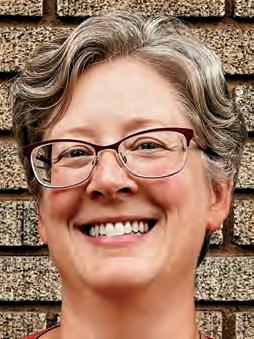
Dr. Tiffany DePriter has taught for UMGC for more than 18 years.
As course chair for one of the university’s highest enrollment courses—STAT 200: Introduction to Statistics—Dr. DePriter sat on the first Faculty Advisory Council and shepherded the piloting and successful implementation of Adaptive Learning Technology (ALT) in STAT 200.
Her commitment to collaboration across disciplines has been demonstrated repeatedly, and she has worked with faculty and students from a variety of programs to support statistical literacy, implementing best practices from both pedagogical and instructional design perspectives. Her ability to meet students where they are is exemplary and helps raise the bar for the foundational learning of statistics.
Marsha Fortney has been part of the UMGC community for eight years, five of them as a faculty development specialist tasked with “teaching the teachers” to employ best practices that ensure student success.
Currently, as part of the First-Term Experience team, she mentors more than 300 adjunct faculty members each semester. She also mentors students, arranging synchronous conversations—no matter where in the world the student is located—to provide personalized feedback and encouragement and offer strategies for overcoming obstacles that are common to adult learners.
An instructor for PACE 111—a UMGC signature course that helps students map out their educational path—she says that it is surprisingly easy to make connections with students, no mat-
ter where they are located, through discussion boards, email, phone, or Zoom conferences. She says this “personal touch” is key to student success at UMGC.
A 2023 winner of the university’s highest award for teaching—the Stanley J. Drazek Teaching Excellence Award—and 2021 winner of the UMGC Presidential Award for distinguished service, she was also nominated in 2023 for the USM Board of Regents Faculty Award for mentoring.
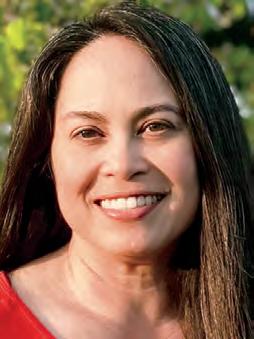
Program Director, Environmental Science and Management, and Collegiate Professor
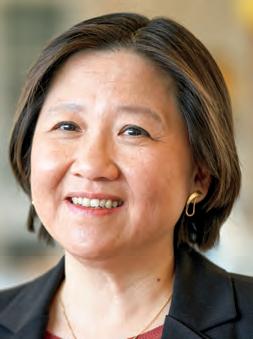
Dr. Sabrina Fu is the founder and inaugural leader of the Howard County Citizens Climate Lobby chapter and coregional coordinator for the Mid-Atlantic region, where she focuses on climate education and works to empower diverse voices to address climate change across the region. She is also a Master Watershed Steward for Howard County, where she helps assess what people can do to minimize stormwater issues for themselves and their community.
A recipient of the U.S. Environmental Protection Agency’s prestigious People, Prosperity, and the Planet Award, Fu was recognized for using her environmental science expertise and her passion for community engagement to bring UMGC students from around the globe to present at the National Mall in Washington, D.C.
In 2022, she received the USM Board of Regents Faculty Award—the highest honor presented by the regents to exemplary faculty members—for excellence in public service.
As part of the many changes Fu has made since becoming director of the environmental portfolio in 2020, she has committed to supporting nonprofits and government agencies to
provide insights to complex issues. In the capstone course for the MS in Environmental Science and Management, students now act as consultants on complex environmental projects for government agencies and nonprofits, providing opportunities for networking and building the teamwork needed to begin addressing complex environmental issues.
Fu headed two global events—which drew an audience from every U.S. time zone and from Asia—for #MakeClimateAClass week, April 1–8, 2024. The first was a documentary screening and discussion with the filmmaker, while the second introduced climate stories from a variety of professions from across the United States.
Collegiate Assistant Professor, Data Analytics
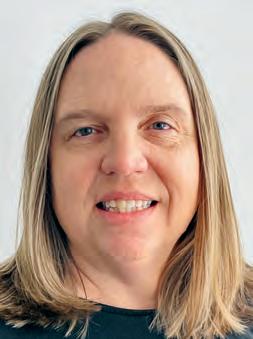
Dr. Kate Goldberg served as faculty advisor to two UMGC students in the MS in Data Analytics program—Shiva Devkota and Zane Liu—who competed in the SAS Curiosity Cup against teams from around the world, including Denmark, France, India, Italy, Oman, and Romania. SAS, the business analytics and software services company, sponsored the event.
Together, the three presented a paper, entitled “Comparing Classification Models of Predicting Diabetes Using SAS Viya,” which focused on the use of classification models to predict factors leading to diabetes. Viya is a data-management program that employs artificial intelligence.
In the first round of judging, the paper was chosen as one of the 10 finalists. During the second round, the UMGC team created a video presentation of the research, winning the data presentation category.
In recognition, the UMGC team received yearlong access to the SAS Academy for Data Science, a digital badge from SAS, a SAS certification exam voucher, and a SAS training course voucher.
“Winning the SAS Curiosity Cup competition is a significant achievement for me, both personally and professionally,” said Devkota. “It validates my hard work, skills, and knowledge in SAS programming and data analysis and potential to make significant contributions in the field.”
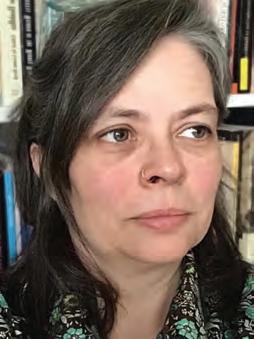
Dr. Heather Hartel organized and leads UMGC’s Applied Humanities Student Club, which stands as a noteworthy model of innovation and interdisciplinary collaboration at UMGC. By blending technology with the humanities, she has opened new avenues for students and faculty alike.
Demonstrating a leadership style that is inspiring and empowering, Hartel encourages learners to explore the boundaries of their disciplines, and club activities reflect this, driving awareness of postgraduate experiences in the applied humanities and challenging participants to think critically about the implications of technologies like artificial intelligence on the humanities.
Her work exemplifies how leadership and vision can transform education, making it more relevant, engaging, and forwardthinking, and her ability to foresee and act upon the intersections of technology and the humanities are invaluable, both inside and outside of academia.
Katherine Im serves as faculty advisor to the Maryland Theta chapter of Pi Gamma Mu, the international honor society of the social sciences. For the past six years, the chapter has been named to the Roll of Distinction, and in 2017, Im was invited to join the Board of Trustees. She currently serves as first vice president of the board and chair of the 2024 Centennial Convention Committee and the Pi Gamma Mu History Project.
During the COVID-19 pandemic, the Maryland Theta chapter—a certifying organization for the Presidential Volunteer Service Award—promoted community service by encouraging members to volunteer virtually for the Citizen Archivist program with the National Archives. The chapter partnered with the Behavioral and Social Sciences Student Association (BSSSA) to host an informational webinar about graduate school.
In 2023—in recognition of her leadership—Im received the Bylee Massey Award, which recognizes a member of the
UMGC community who has made a significant contribution that directly benefits the university and who has gone “above and beyond” as a volunteer supporting a university initiative, project, or event.
Collegiate Professor, Mathematics and Statistics
Adelaide Lagnese has been part of the UMGC family for more than 35 years, and her expertise in teaching liberal arts math to non-STEM students has had an impact on thousands of students worldwide. In 2018–19, she led UMGC’s first Adaptive Learning Technology (ALT) General Education Mathematics (GEMs) in designing the very successful MATH 105: Topics for Mathematical Literacy. With success rates above 80 percent in the new course, Lagnese’s work led to the subsequent pilots of ALT in MATH 107: College Algebra and STAT 200: Introductory Statistics.
Overseas Collegiate Professor, English and Writing

Dr. Malia McCarrick joined UMGC in 2014 and has taught writing and English in both Europe and Asia, enriching the learning experience through her unwavering commitment to education and passion for teaching. In UMGC Europe, she serves as the leading organizer of the Writing Doctor, an online weekly tutoring venue, providing personalized guidance to writers across a variety of styles, from academic essays to professional communication.
During the fall of 2020, when the pandemic prompted a shift from an in-person to virtual format for UMGC Europe students, learners from across Europe were able to access Dr. McCarrick’s expertise via this weekly meeting.
Today, more than three years after its inception, a team of faculty, including Dr. Geri Henderson, Dr. Katy Koch, Dr. Judith McNeely, Prof. Ashley Romain, and of course, Dr. McCarrick—all of whom hold advanced degrees in English and/or creative writing and have significant publication experience—support the Writing Doctor effort, providing the European military community with convenient, weekend access to writing coaches and tutoring help.
Overseas Collegiate Associate Professor, Mathematics
Cynthia McGinnis has taught mathematics for UMGC in Asia since 2019 and has distinguished herself as both a skilled and creative instructor and a mentor to students and colleagues alike.
She has augmented the classroom experience by developing simulations—using programming languages like R and Python—to increase comprehension of challenging mathematical concepts.
As a faculty coordinator, she has developed mentoring forms for new faculty that offer guidance and support. Through a training module, entitled “Engage to Educate,” she empowers faculty by introducing effective teaching techniques and strategies that promote active learning.
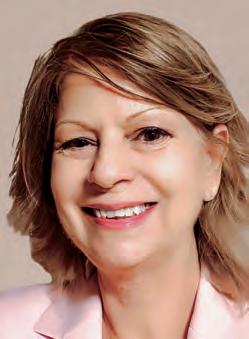
In nominating her for the prestigious USM Board of Regents Faculty Award for teaching, colleagues called her teaching style “deeply impactful” and credited her mentorship for “enhancing the quality of education and promoting a culture of continuous improvement and innovation.”
Collegiate Professor, History

Dr. Danielle Mead Skjelver approaches history as a way to empower students to explore why people thought as they did in the past, and how that has changed over time. She strives to provide learners with a safe space to think out loud and innovate, practicing what she terms “radical flexibility,” trusting students with time management, and recognizing that they are often professionals who face significant family demands in addition to work.
She serves as the faculty advisor for the History Student Society (HSS), which won the 2022 and 2023 Student
Organization of the Year Awards and offers a safe forum for students and alumni to mentor one another and foster longterm professional and social relationships. In 2022 and 2024, HSS hosted UMGC’s first International Undergraduate History Conferences, featuring papers from college students worldwide. Drawing on past experience in finance, she has served on UMGC work groups and councils, helping define core values and shape policies and procedures related to general education; diversity, equity, and inclusion; and student persistence.
In 2021, she established a network of faculty experts with whom students in the history capstone course series can connect and has already paired more than 120 students with subject matter experts who can coach and mentor them through the initial phase of the history capstone project.
A three-time winner of UMGC’s Teaching Recognition Award, she is lead editor of a digital, living, open-access textbook, History of Applied Science and Technology, and serves on the executive committee of Scientiae, an international, interdisciplinary research group focused on the nexus of the Renaissance, Early Modernity, and the history and philosophy of science.
Overseas Collegiate Professor, English and Literature

Dr. Jessica Stock has taught for UMGC since 2015, joining the university full time in 2018 to teach English and literature. A gifted instructor, she received the university’s highest award for teaching—the Stanley J. Drazek Teaching Excellence Award—in 2023.
As the advisor for UMGC’s field study programs, she creates unique learning experiences and supports the faculty who deliver them. Recognizing the importance of remembering the Holocaust, she—with Dr. Michael Mulvey—applied for and received a grant from Northwestern University to develop a field study experience focused on Holocaust memory.
In 2020, recognizing how the pandemic isolated community members, she founded the UMGC Europe Book Club, which meets online and boasts more than 200 members. The club provides a reliable and safe community for readers to discuss challenging narratives. Her leadership led to an invitation to
write a bimonthly literature column for Stars and Stripes.
As a member of UMGC Europe’s Diversity Council, Dr. Stock speaks to military units about the importance of empathy to leadership and has presented her lecture on “Cultivating Empathy Through Literature” to AFN, NATO, and JAG conferences.
Collegiate Associate Professor, Digital Forensics and Cyber Investigation

Jesse Varsalone has taught since 1994, including as an instructor for the U.S. Department of Defense at the Defense Cyber Investigations Training Academy (DCITA).
He has mentored both students and faculty at UMGC, recruiting more than 30 professionals who now work for UMGC as adjunct faculty, lab assistants, and full-time staff, and in 2016 received the USM Board of Regents Faculty Award for mentoring. As a full-time collegiate faculty member, Varsalone created more than 100 videos—which have now been integrated into graduate and undergraduate coursework at UMGC—explaining labs, projects, and important concepts in cybersecurity.
He has also created capture-the-flag competitions within courses on ethical hacking and computer forensics, allowing students to test themselves in cybersecurity challenges and record video demonstrations that they can leverage in their professional portfolios.
Since 2015, Varsalone has coached the UMGC Cyber Competition Team—a diverse group comprising undergraduate and graduate students, alumni, adjunct faculty, and staff—to more than 50 top-three finishes and awards. Currently, UMGC stands eighth in the world and third in the U.S.—and climbing— in HackTheBox rankings.
Varsalone has also run cyber competitions as recruiting tools on military bases where UMGC offers classes and at community colleges with which UMGC maintains partnerships. Varsalone met former UMGC undergraduate and graduate student Christopher Haller—who won the 2022 National Cyber League competition, beating out more than 6,000 other competitors—at a UMGC capture-the-flag competition at Langley Air Force Base. Varsalone and Haller have now collaborated on a book, The Hack Is Back, due out in August 2024 from CRC Press Publishing. F

University of Maryland Global Campus is launching new programs to help prepare students to meet market demand in critical areas. Gain the specialized skills employers are looking for with the MS in Clinical Professional Counseling or the MBA with a concentration in Global Business, Finance, Human Resource Management, Nonprofit Management, Marketing or General Management.
• Programs backed by the reputation of an accredited state university
• Online courses so you can learn wherever, whenever
• Faculty who bring a wealth of knowledge & industry experience
• Affordable tuition & scholarships for eligible students
More than 294,000 members strong and growing!
In today’s global economy, networking is an essential tool for every professional. As part of the UMGC alumni community, you can tap into a vast network of professionals with similar goals and career aspirations—online and at 175+ locations worldwide.
Complimentary UMGC Alumni Association membership provides exclusive access to
• Networking opportunities
• Career resources
• Mentoring
• Alumni benefits and discounts
• Alumni events
• Volunteer opportunities, and more
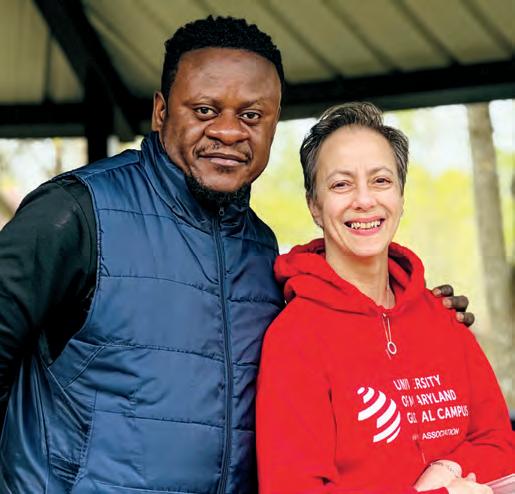

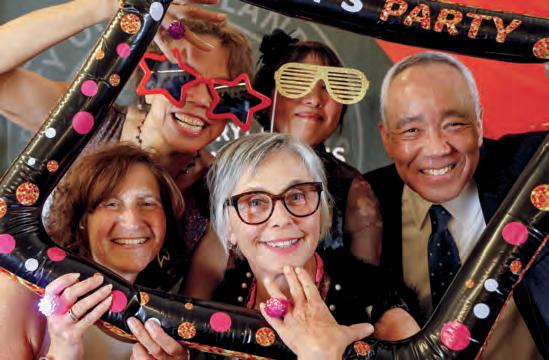
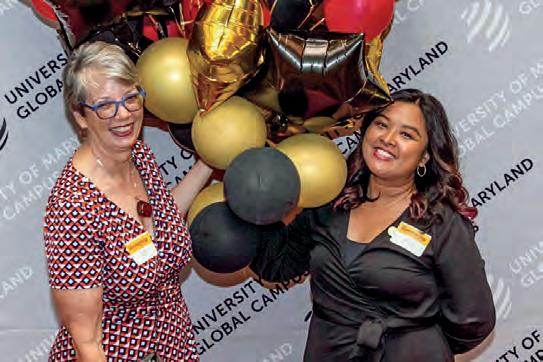


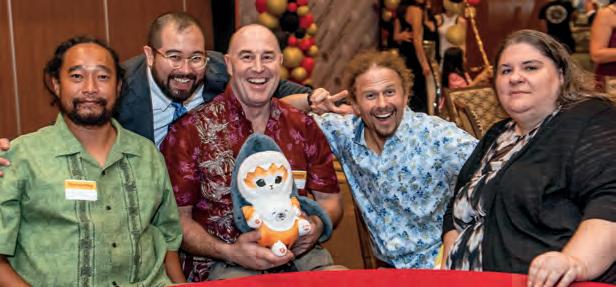
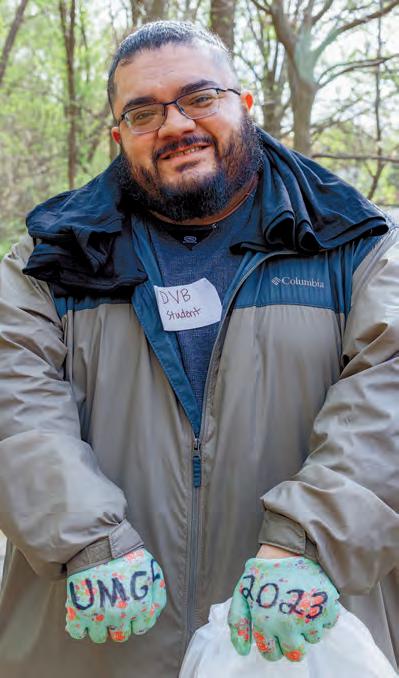
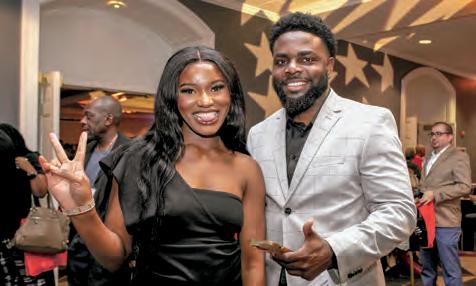
3501 University Boulevard East
Adelphi, MD 20783-8003
800-888-8682
umgc.edu
Follow us on social media to discover more about classes in Japan, field studies in Europe, and everything we’re up to in Maryland and around the world. Stay connected for all the latest updates by visiting umgc.edu/social.
